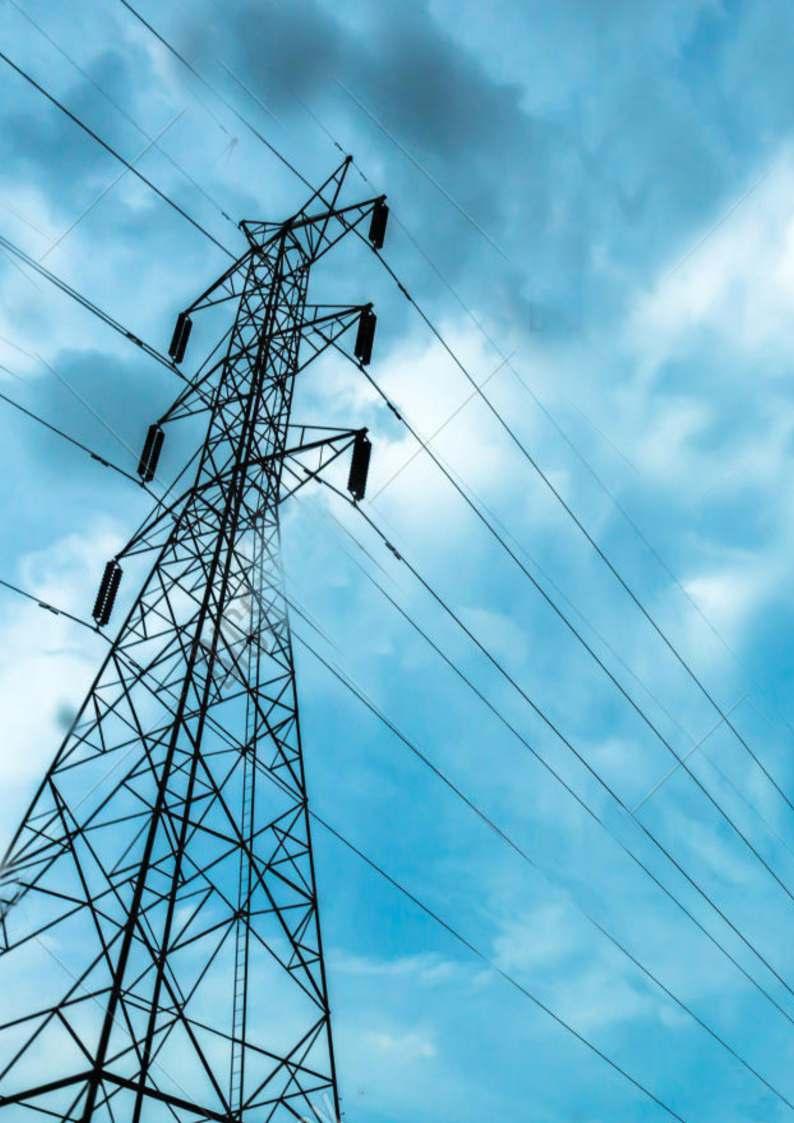
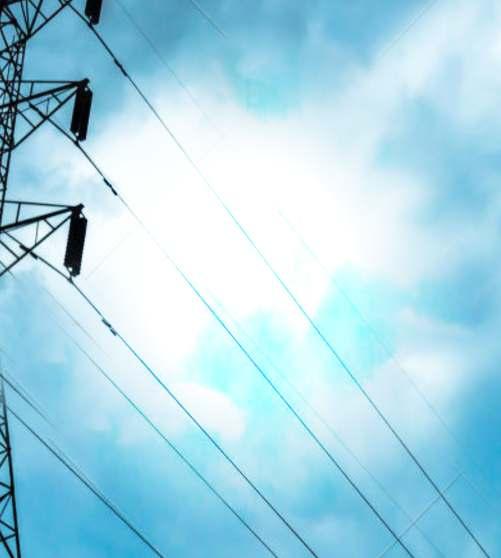


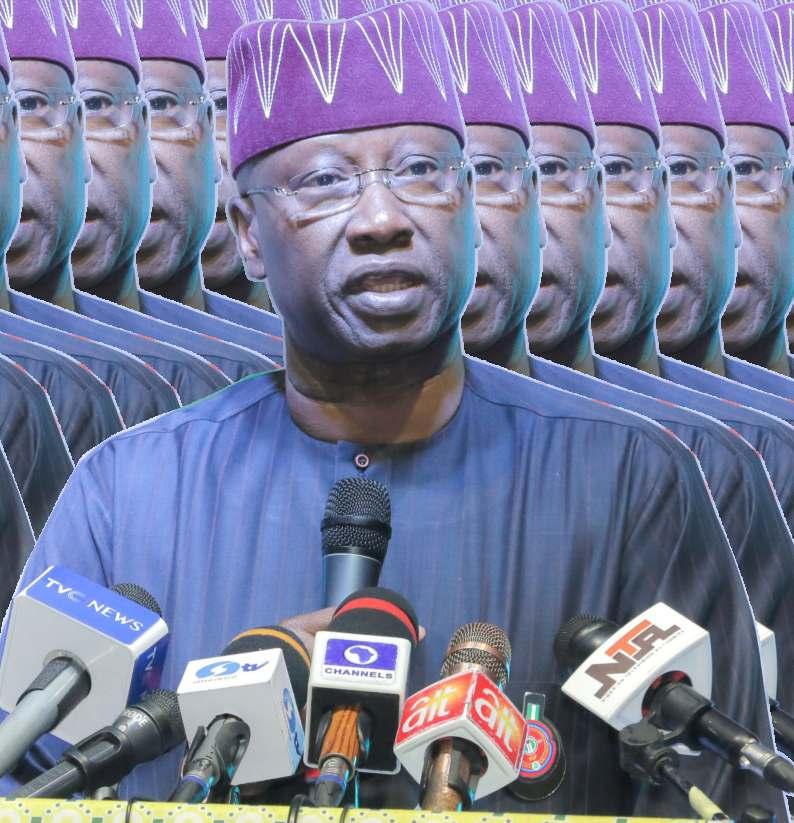





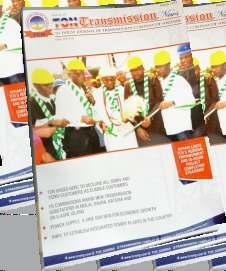



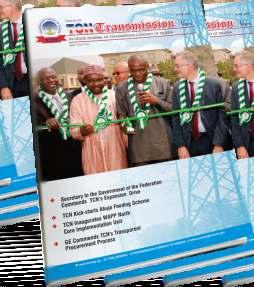


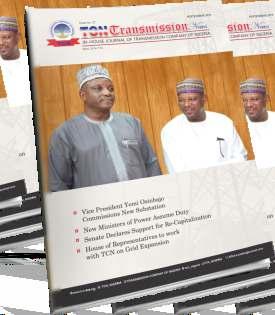

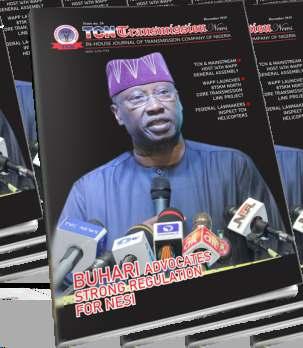

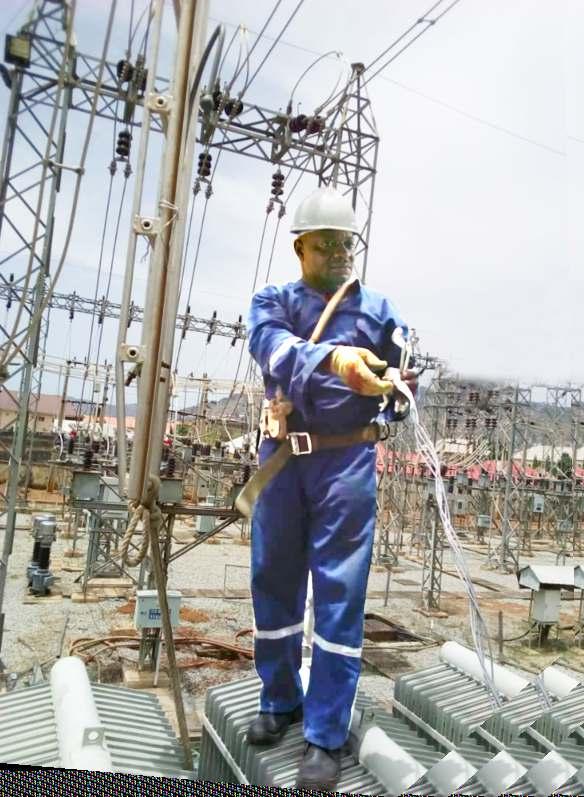


Mamman Calls for Synergy with Stakeholders in The Power Sector
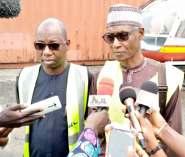
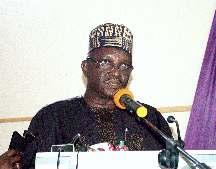
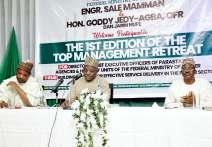
The World Bank and IMF Delegates Meet with TCN Management to Discuss Power Sector Reform, Challenges and Way Forward
President Buhari Advocates Strong Regulation for Electricity Market Across ECOWAS Countries
Mainstream Host
WAPP General Assembly In Abuja
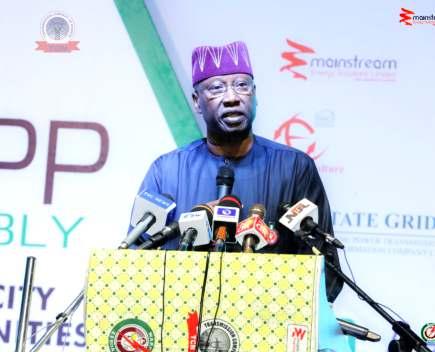
875km Powerline Project
Government Reiterates Its Commitment to Improving the Power Sector
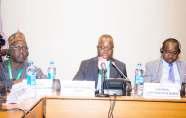
CONTENTS 06
12 Federal
09 TCN,
14th
...Launch
18
16
21 26 Igali Lauds TCN’s Effort at Incremental Power TCN Meets EKO and IKEJA DisCos on Areas of Cooperation for More 12 09 11 Federal Lawmakers Inspect Disused TCN Helicopters 16 11 TCN NEWSLETTER VISION To be one of the leading electricity transmission companies in the world To transmit electricity in the most efficient and effective manner MISSION CORE VALUES Integrity, Transparency, Sustainability, Professionalism, Customer Focus, Teamwork and Safety Transmission Company Of Nigeria 3
EDITOR’S NOTE


iInafewdays,wewouldcometotheendofyear 2019. While we all look forward to great accomplishments in year 2020, the TCN TransmissionNewswouldliketowishyoualla veryhappyandpurposefulnewyear.
This edition of our magazine continues to showcase TCN’s determination to build a strong transmission grid in line with its wellarticulated Transmission Rehabilitation and ExpansionProgramme(TREP).
In the month of November, TCN hosted the WAPP 14th General Assembly which was attended by ECOWAS member states within thesub-region.TheGeneralAssemblysetsthe tone for power activities among member states for the following year, as the states continue to work towards a more integrated electricityindustrywithinthesub-region.
With the launch of the Eastern Back Bone 330kV transmission line project which would be executed by WAPP in Nigeria, some areas with little or no transmission presence within the country such as Ikom, Ogoja in the South South Region up to Potiskum and Azare in the NorthEastRegionwouldhavebetteraccessto electricity as the line, in conjunction with associated substation projects would bring more bulk power to the areas for distribution byDisCos.
Meanwhile, AfDB approved the Nigerian TransmissionExpansionProjects(NTEP-1)in November, 2019. NTEP-1 would finance a number of projects in the North West, South SouthandSouthEastareasofthenation.This approval further adds momentum to TCN’s projectsexecutionandgridexpansiondrive.
Also, the execution of the Abuja Feeding Scheme that would build five new substations, 132kV transmission lines connectingthesubstationsandoneadditional 330kV transmission line feeding Abuja is progressing as scheduled TCN’s collaborative efforts continues with the Governments of Imo, Akwa Ibom and Borno States among others, to further facilitate transmissionprojectsexecution.
With all these achievements among many others, geared towards strengthening the nation’s transmission network, emphasis is still on the recapitalization of the DisCos in tandem with TCN’s expansion efforts, to ensure that grid capacity increase is felt by end users of electricity nationwide. I believe youwillfindthiseditionquiteinformative.
NdidiMbah Editor-in-Chief
Editorial Team
Ismail Dalhatu
Transmission Company Of Nigeria 4 TCN NEWSLETTER
MD/CEO's MESSAGE
AswematchintotheNewYear, it is pertinent for us to appreciate our collective successes recorded in the year 2019 and reaffirm that the Management of TCN will continue to explore avenues of improving staff welfare and capacity building The Management recognises the sterling performance of staff in 2019whichhasassistedsignificantlyinpositioning TCN in the Nigeria Electricity Market (NEM). The positive change is also due to the new focus of Management which equally galvanised staff performance The company has indeed been transformed from the weakest company in the Nigeria Electricity Supply Industry (NESI) to the most pragmatic, and indeed leading most innovations. Unlike in the past, TCN is currently leading all efforts expected to take the Nigeria ElectricitySupplyIndustry(NESI)tosustainability.
TCN concluded the 20Year Least Cost Transmission ExpansionPlanthroughsupportfromtheWorldBank whichisthefirstofitskindinthehistoryofNigeria,and established the Transmission Rehabilitation and Expansion Program (TREP) with Development Objective “to rehabilitate, stabilize, provide redundancy consistent with international best practice of N-1 reliability and expand the wheeling capacityofTCNto20,000MWinfouryears”.
TCN will vigorously sustain the implementation of TREP with its four point strategies; Critical Investment in Lines and Substations, Frequency Control, Spinning Reserve, Effective Supervisory ControlandDataAcquisition(SCADA)andwillsupport alleffortsin2020andbeyondtoensurefullrealization ofthelaudableobjectivesoftheprogram.
In addition, in 2020 and going forward, TCN will focus on repositioning the company not only by expanding capacity and redundancy but also by building a modern organization in line with our Vision, Mission and Core Values. These will include various capacity buildingprograms,EnterpriseResourceManagement and stronger partnership with staff for further repositioningoftheorganization.
In conclusion, the journey that will transform TCN to becoming one of the leading power transmission companies in the world has started on a positive step and we will sustain the tempo. However, a holistic developmentofthesector needsthesupportofallfor the sustainable development of TCN and NEM in general.
OnbehalfoftheentirestaffofTCN,Iappreciateyouall for your contributions in the year 2019 and wish you andyourfamiliesahappyandprosperousNewYear.
U.G.Mohammed
ManagingDirector/CEO
TCN NEWSLETTER Transmission Company Of Nigeria 5
Secretary to the Government of the Federation (SGF), Mr. Boss Mustapha
PRESIDENT BUHARI ADVOCATES STRONG REGULATION OF ELECTRICITY MARKET ACROSS ECOWAS COUNTRIES
By Eric Ephraim Ene
“One major area I would also want to highlight regarding electricity going forward, is regulation.
Local and regional regulators in the industry must be strong
President Muhammadu Buhari has advocated for a strong, effective a n d p r o a c t i v e regulation for the electricity market across member states of Economic Community of West African States (ECOWAS) to ensure quality performancefromserviceproviders.
Buhari made the advocacy in his address at the 14th Session of the General Assembly of the West African Power Pool (WAPP), with the theme: “ECOWAS Regional Electricity Market: Today and Future Opportunities” on Friday,8thNovember2019,inAbuja.
The President, who was represented attheoccasionbytheSecretarytothe Government of the Federation (SGF), Mr. Boss Mustapha, said that for electricity industry to be taken seriously, penalties must be applied when necessary to instill discipline in themarket.
He said, “One major area I would also want to highlight regarding electricity goingforward,isregulation.Localand regional regulators in the industry must be strong. They must be firm, effective, proactive, technology and knowledge-driven. This is the sure way of deriving quality performance from service providers. Regulation

Transmission Company Of Nigeria 6
must be taken seriously and penalties applied when necessary to instill discipline in theentiremarket”.
He also tasked ECOWAS countries to harness, develop and share energy resources with the primary objective of improving access to steady and affordable electricity. “The huge potential for electricity generation within the region still remains underdeveloped, slowing economic development ofmembercountries”hesaid.
According to him, these are clearly indicated by human development indices, it is therefore important that WAPP progresses in the direction of incorporating the countries and developing energy resources available across the region towards achieving the objectives of reliable and affordable electricityforallcitizens.
He charged West African nations tofocusonthecurrentrealityand
bridge the gap in the region by embracing renewable energy to mitigate the impacts of climate change, adding that Africa must strive to produce clean energy as seenindevelopednations.
The President also commendedWAPPforthe launch of the 875 Kilometers North Core Project, a 330kV transmission line that would be constructed from Nigeria through the Republics of Niger, Benin and Togo and terminating inBurkinaFaso.“Itwillfacilitatea huge power exchange in the sub region. This and all the other projectsintheWAPPMasterPlan should be vigorously pursued by allstakeholders,”hesaid.
He appealed to members of the diplomaticcorps,investorsinthe electricity market and i n t e r n a t i o n a l f i n a n c e organizations to eschew corruption in whatever form and shape because corruption is an
enemy of development and productivity.
Speaking at the occasion, the Minister of Power, Engr. Sale Mamman,saidhewasimpressed w i t h W A P P ' s r o l e o f interconnecting 14 member countries of ECOWAS and noted that Nigeria was advancing on projects that would increase regional integration as well as cross-borderpowertrade.

According to him, Nigeria has abundant gas resources, and the Federal Government was strengthening power sector capacity to facilitate the export of lowcostelectricityintheregion.
 Cross section of Delegates at the event
Minister of Power, Engr. Sale Mamman
Cross section of Delegates at the event
Minister of Power, Engr. Sale Mamman
“The huge potential for electricity generation within the region still remains underdeveloped, slowing economic development of member countries”
Transmission Company Of Nigeria 7
The President of ECOWAS Commission, Mr Jean Claude Kassi Brou, represented by the ECOWAS Commissioner for Energy and Mines, Mr. Douka Sediko, on his part disclosed that the region was facing severe danger and that no sustainable development can be attained without energy. He noted that in o r d e r t o a c c o m p l i s h d e v e l o p m e n t , E C O W A S Commission has placed energy as priority in an effort to increase electricity supply to citizens of memberstates
According to him, ECOWAS Heads of States have adopted an Electricity Master P l a n f o r t h e development of the region and assured of the Commission's commitment to the implementation of all the projects which would support the improvement of livelihood in the region.
On his part, the Chairman, Executive Board of WAPP, and M a n a g i n g Director/CEO of
TransmissionCompanyofNigeria ( T C N ) , M r . U s m a n G u r Mohammed, reiterated the need for the region to build new transmission interconnections to further increase cross border exchange and improvestabilityof thepool.

He noted that in order to accomplish development, ECOWAS Commission has placed energy as priority in an effort to increase electricity supply to citizens of member states.
Mr. Mohammed who disclosed that the first stages of ECOWAS regional market was launched by bothECOWASRegionalElectricity Regulatory Authority (ERERA) and West African Power Pool (WAPP), in June 2018, further stated that there was need to sustainthegainsof “PhaseOne” while considering the launching of “Phase Two” in 2021. “The Second Stage shall signal the commencement of day ahead trading which will replace the bilateralcontractingofStageOne. For a seamless transition to the phase Two, we must build confidence into the market in a way that the market can attract the much needed private investment”hesaid.
He further noted that while West Africa has a population of over 350million,morethan40percent of the people lack access to electricity, noting that electricity consumption per capita intheregionisoneofthe lowestintheworld.
In his remarks, the Secretary General of WAPP, Mr. Siengui Ki commended the Federal Government of Nigeria and all financial and technical partners for their support in hosting the event, and also assured that all physical projectsembarkedonby the regional body was progressing well in the 14membercountries.
 (5th from right) Minister of Power Engr. Sale Mamman
Chairman WAPP and MD/CEO TCN, U. G Mohammed
(5th from right) Minister of Power Engr. Sale Mamman
Chairman WAPP and MD/CEO TCN, U. G Mohammed
TCN NEWSLETTER Transmission Company Of Nigeria 8
TCN, MAINSTREAM HOST 14TH WAPP
GENERAL ASSEMBLY IN ABUJA: ....Launch 875KM Powerline Project
By Kazah Bili Akau
(L-R), MD Mainstream Energy, Engr. Lamu Audu, Secretary General WAPP, Siengui Ki, and WAPP Chairman and MD/CEO TCN, Mr U. G Mohammed,
The Transmission Company of Nigeria (TCN)inconjunctionwithMainstream Energy Solutions Ltd. co-hosted a weeklong 14th Session of the West African Power Pool (WAPP) with the theme: 'ECOWAS Regional Electricity Market: Today and Future Opportunities', at the Transcorp Hilton Hotel, Abuja, from 4th to 8th November2019.
Delivering his welcome address at the Joint Opening Ceremony of the Organizational Committees of WAPP, the Managing Director of TCN and Board Chairman of WAPP, Usman Gur Mohammed, said committee members should put in their best as their recommendations were vital to achieving the main objective of WAPP which he said is to provide affordable electricitytotheregion.
MohammeddisclosedthatWAPPhadinitiatedplansfor providing cheap electricity to the region through the 2019/2033 WAPP Generation and Transmission Master Plan, which was approved by the ECOWAS Council of HeadsofStatesandGovernmentsinDecember2018,to eliminate the building of expensive emergency power plants with expensive by-products, opting rather for plants that would provide cheap electricity, flexibility and redundancy as well as transmission connectivity throughoutthemainlandcountriesintheregion.
He added that the master plan would also ensure the connection of WAPP to Central African Power Pool (CAPP) as well as the Northern African Power Pool (NAPP) to guarantee seamless power supply from areas with cheap generation capability to those with potentially costly generation capability within the continent.
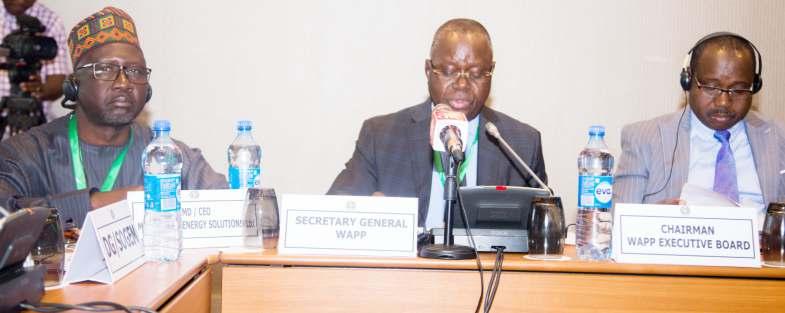
TCN NEWSLETTER Transmission Company Of Nigeria 9
During the interview session, the ManagingDirectorofMainstreamEnergy, Engr. Lamu Audu, said that Mainstream Energy had increased electricity generation capacity in both Kainji and Jebba Hydro Power Stations to 9000MW and is ready to participate in the regional market.
He said Mainstream Energy is in position to generate cheap electricity and therefore can effectively engage in electricity trade with countries that are upstream for affordableelectricity.
Engr. Lamu Audu, said that Mainstream Energy had increased electricity generation capacity in both Kainji and Jebba Hydro Power Stations to 9000MW
(IPPF) for supporting WAPP, and equally lauded utilities and countries that preparedtheprojectforfinancing.Healso commended the African Development Bank (AfDB), World Bank, European Union and the Agence Française de Développement (AFD) for financing the implementationoftheproject.
Meanwhile, the West African Power Pool (WAPP), has launched the 875KM, 330kV WAPP North Core Interconnection Power Line Project which is expected to link the Federal Republics of Nigeria, Niger, Benin, Togo and Burkina Faso to increase electricity trading capacity and reduce the cost of electricity within the sub-region.
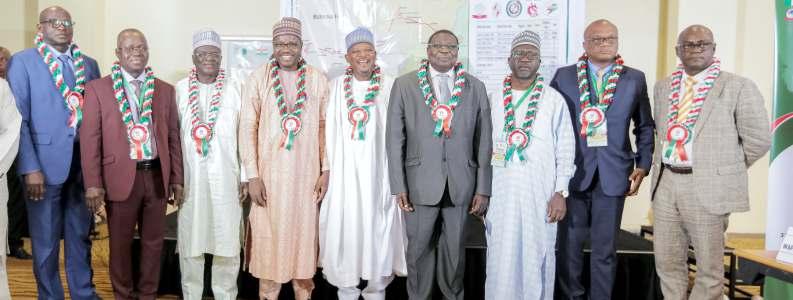
At the launch of the project which was held on 7th November 2019, at the Transcorp Hilton Hotel, Abuja, the Minister of State, Power, Goddy Jedy Agba, in his keynote address explained that the implementation of the WAPP North Core project would complement the existing interconnections between Nigeria and Benin/Togo as well as Nigeria and Niger to facilitate power exchange within the sub region and reinforce theparticipationofNigeriainthedevelopingelectricity market.
Jedy Agba applauded the collective effort of New PartnershipforAfrica'sDevelopment(NEPAD)andthe International Professional Practices Framework
In his address, the Managing Director of TCN and Chairman of WAPP, Usman Gur Mohammed, emphasized the importance oftheprojecttotheregion.Henotedthatthelaunchof theprojectsymbolisesthepositivewillofWestAfrican countries and their utility companies to synergise in order to provide sustainable electricity supply to the region's population which is also a step towards the attainment of borderless energy landscape within WestAfrica.
Mohammed expressed his appreciation to the government of Nigeria under President Buhari, and other governments as well as organisations and utilities for supporting the implementation of the project.
Abriefpresentationoftheprojectwasdeliveredbythe Director of the North Core Project Implementation Unit, Engr. Mailele Amadou Djibril, where he mentioned that the 875KM project is expected to be commissionedinApril,2023.
Other personalities in attendance were Secretary General, WAPP, Siengui Apollinaire Ki and representatives of technical and financial partners including World Bank, AFD, AfDB, European Union, NEPADamongothers.
Centre Minister of State, Power, Goddy Jedy-Agba
TCN NEWSLETTER Transmission Company Of Nigeria 10
FEDERAL LAWMAKERS INSPECT DISUSED TCN HELICOPTERS
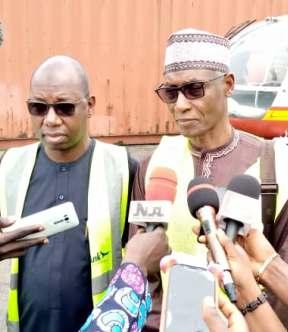
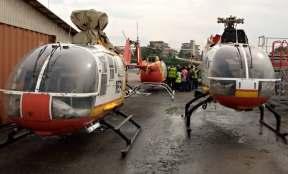
Senator said that new and modern helicopters would be very useful to TCN for effective faults tracingandrepairs.Heequallyopinedthatwiththe commercialization of TCN, the company should be abletoputthenewhelicopterstocommercialuse.
On his part, the General Manager (Research and Development) TCN Headquarters, Abuja, Dr. Inugonum Thomas, said that the estimated worth ofthefourhelicopterswasestablishedthroughan evaluationbyarenownedAviationconsultant.
By Tosin Olasehinde
FollowingtherecentproposalbytheManagementof TransmissionCompanyofNigeria(TCN)tosellfour grounded helicopters in its fleet, the Senate Committee on Power, alongside its counterpart in the House of Representatives had on Saturday, 19th October 2019, inspected the helicopters parked at the Domestic WingoftheMurtalaMohammedAirport,Lagos.
The team, which was led by Senator Yusuf A. Yusuf representing Taraba Central, said the committee's mission was to ascertain the status of the four helicopters with registration numbers; 5N-ASK, 5N-ASJ, 5N-BCJand5N-EPA.
Hestatedthatfromthecommittee'sfindings,thefirsttwo helicoptersareserviceablewhiletheothertwocannotbe rehabilitated. After the inspection of the helicopters, the committee said that having concluded the inspection, theywouldinviteTCNtoameetingforfurtherdiscussions todeterminethenextsteps.
On the issue of obtaining new helicopters for TCN, the


Also speaking, the Regional Transmission Manager, Lagos Region, Engr. Adebola Lamina, emphasized the importance of having functional helicopters for network surveillance as it would enable prompt identification and fixingoffaultsontransmissionlines across the country, especially in verydifficultterrainsasagainstthe manualmethodbeingusednow. He explained that before now, the four helicopters were used by the defunct NEPA to check transmission lines faults, especially in dangerous areas and thick forests that cannot be easily accessed by staff, adding that the helicoptersmadethejobfasterand easier.
TCN's transmission network, he said, consists of over 12000KM and 15000KM of 330kV and 132kV transmission lines respectively, hence the need for good helicopters with modern technological accessories for transmission lines maintenance and monitoring which is very key to minimizedowntime.
The four helicopters were inherited by TCN after theprivatizationexerciseinthePowerSector.
Disused Helicopters
(R-L), Senator Yusuf A. Yusuf representing Taraba Central and Honourable Sada Soli addressing pressmen during the inspection tour
TCN NEWSLETTER Transmission Company Of Nigeria 11
FEDERAL GOVERNMENT REITERATES ITS COMMITMENT TO IMPROVING THE POWER SECTOR
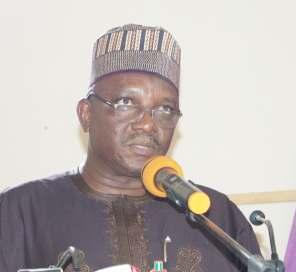
He however noted that the Federal Government, through the power sector recovery programme is, trying to strengthen the sector's institutional framework,increasetransparency,implementclear policies that promote and encourage investor confidence.
By Maimuna Isah-Ladan
TheFederalGovernmenthasreiterated its commitment towards tackling the challenges in the power sector. This was made known by the Minister of Power, Engr. Sale Mamman, at a national discourse organized by the Kaduna State Polytechnic on Thursday, 28th November 2019, to address the challenges of the power sector in the country.
Delivering his keynote address, the Minister of Power acknowledged that the power sector reform has not met the expected impact largely due to severe structural deficits in both transmissionanddistributionnetworks.
The Minister said a lot of achievements have been made as a result of regulatory and other policies being implemented by the present administration, adding that he had earlier commissioned a 47.5 kilowatts solar system for Doka General Hospital in KachiaLocalGovernmentAreaofKadunaState.
He explained that the success of the solar project can be attributed to Federal Government’s collaboration with development partners and the p r i v a t e sector He lamented that d e s p i t e achievements recorded in p o w e r generation and increased transmission capacity, the Distribution Companies (Discos) were not doing enoughtotakeelectricitytotheconsumingpublic.
He lamented that despite achievements recorded in power generation and increased transmission capacity, the Distribution Companies (Discos) were not doing enough to take electricity to the consuming public.
Minister of Power Engr. Sale Mamman
TCN NEWSLETTER
Transmission Company Of Nigeria 12
In his remarks, the Managing Director of the Transmission Company of Nigeria (TCN), U. G Mohammed, who was the Chairman of the occasion, called for the recapitalization of the 11 existing Distribution Companies across the country.
MrMohammedfaultedtheprivatizationprocessof the Distribution Companies in 2013 which led to their mismanagement, and stated that it would be more beneficial to Nigeria and the power sector if distributioncompanieswererecapitalized.
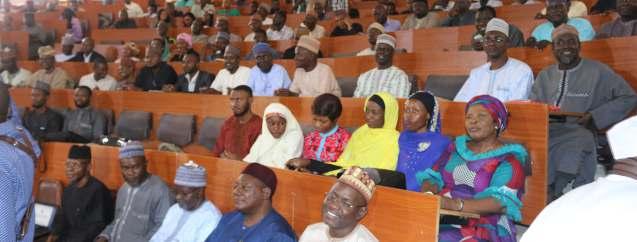
He said that transmission capacity has improved tremendously and as at December 2018 had reached 8100MW. The Discos, he informed, lack the capacity to effectively distribute electricity to customers across the country which has resulted in stranded capacities both at generation and transmissionsegmentsofthevaluechain.
The MD further disclosed that over the last few years,TCNhasmadesignificantimprovementwith several installations including 68 commissioned powertransformersacrossthecountry. Headded that TCN engineers have equally fixed transformers that were damaged in the past and have successfully commissioned them. He said TCN is planning to set up a transformer repair workshop.This,henoted,willhelpreducethecost of repairing transformers as it will be done by inhouseengineers.
Mr. Mohammed gave detailed explanations on the Transmission Rehabilitation and Expansion Programme(TREP)initiatedbyTCNandhow$1.661 billion from multi-lateral financing agencies have
been secured to fund the projects. He said TREP is expected to expand and stabilize the capacity of the gridto20,000MWby2023.
AformerDirector-GeneralofEnergyCommissionof Nigeria, Professor Abubakar Sambo, who presented apapertitled“Thewayforwardforthepowersector”, noted that although the power sector reforms had not led to significant improvement in electricity supply there was need to increase the electricity, supply base. Professor Sambo also stressed the need for government to review licenses of distribution companies, and strengthen regulatory activities amongothers.,
Earlier, the convener of the event and Rector of Kaduna Polythecnic, Professor Idris Bugaje ,State decriedthelongyearsofneglectofthepowersector and highlighted things that must be done to achieve the Sustainable Development goals of the United Nationswhichaimsatprovidingaccesstoelectricity toallbytheyear2030.
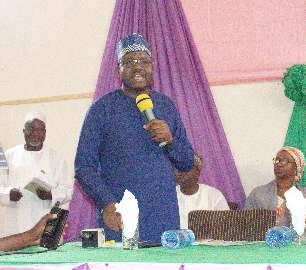
TCN NEWSLETTER
Cross Section of Staff and Students of Kaduna Polytechnic
(Standing), MD/CEO TCN, U. G Mohammed
Transmission Company Of Nigeria 13
AFRICAN DEVELOPMENT BANK (AFDB) APPROVES NTEP-1 PROJECTS
By Ndidi Mbah
The board of the African Development Bank(AfDB)hasapprovedthesumof $210Million for the first part of TCN's
Nigerian Transmission Expansion Program (NTEP 1), in a board resolution on November 27, 2019, in AfDBHeadquarters,Abidjan.
NTEP-1isoneoftheprojectsunderTREPfinancedby AfDB that is targeted at rehabilitating and expanding
partsofthetransmissiongridintheNorthWest,South South and the South East The project would reconstructoldtransmissionlinesandbuildnewones as well as construct new substations, which will furtherincreaseTCN'stransmissioncapacity.
Even though the approval has just been given, the company had already concluded Environmental Studies including the Resettlement Action Plan, which had been submitted to AfDB. Also, the adverts for pre-
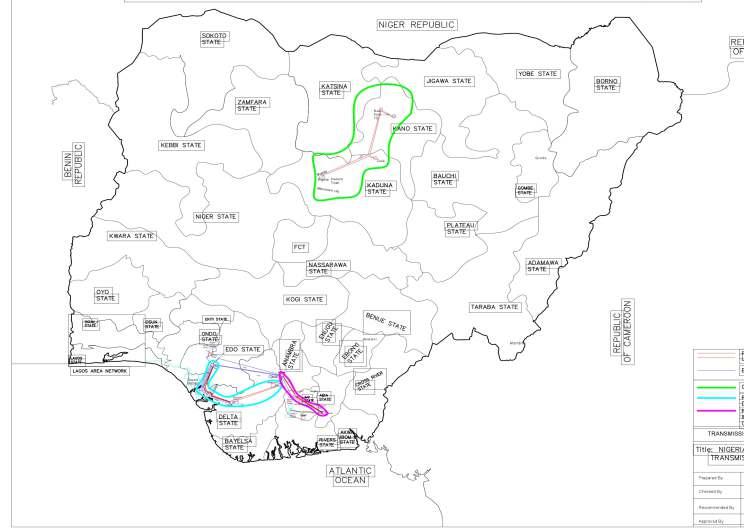
TCN NEWSLETTER Transmission Company Of Nigeria 14
qualification of contractors and consultants had equally been p u b l i s h e d u n d e r a d v a n c e procurement. Evaluation of submissionsareon-going.

Adopting the use of advance procurementhasgivenTCNleadtime, reducing procurement period by 6 months. The procurement processes for the project is about 70% complete, meaning that execution of NTEP-1 projects would soon commence in earnest, even though it has just been approvedbytheAfDBboard.
NTEP-1projectswouldaddresssome transmission lines and substations' requirements in the North West, South South and South East regions of the nation. In the North West, the projects that would beexecutedinclude the construction of 212KM Double Circuit 330kV Quad conductor (Kaduna to Kano); installation of 2x150MVA and 2x60MVA transformers and bay extensions in Zaria; installation of 2x150MVA and 2x60MVA transformers with associated bay feeders and bay extensions in Kaduna Millennium city; installation of 2x60MVA transformers and outgoing feeders in Rigasa, Kaduna; and the installation of 2x60MVA transformersandout–goingfeedersinJaji, Kaduna. The substations would all have
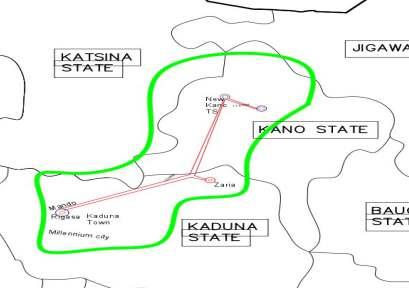
turninandturnouttransmissionlines.
In the South South and South East, NTEP-1 would reconstruct the 107KM double circuit Delta-Benin transmission lines into a 330kV quadline;reconstructthe138KMAlaoji-Ihiala–Onitsha Single Circuit line into 330kV Double Circuit Quad line. TCN noted that NTEP-2 which wouldexecuteprojectsmainlyintheNorthEast and parts of the central states of the nation, is also in the pipeline and has reached advanced stageonthefundingprocessing.
The present management of TCN is determined to ensure that the projects are completed as scheduled, in line with its four-year Transmission Rehabilitation and Expansion Programme (TREP) The time frame for executionofNTEP-1projectsistwenty-four(24) monthsafterawardofcontracts.
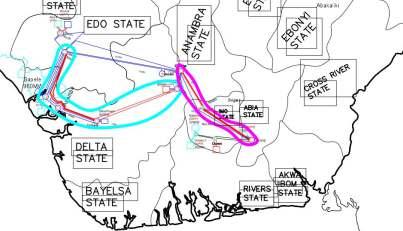
TCN NEWSLETTER Transmission Company Of Nigeria 15
MAMMAN CALLS FOR SYNERGY WITH STAKEHOLDERS IN THE POWER SECTOR
By Uloma Osuagwu
he Minister of Power, Engr
TSale Mamman has called for synergy between all stakeholders in the power sector intheimplementationoftheircore mandate for effective service delivery.
Engr.Mamman,whomadethecall during the first edition of top management retreat for
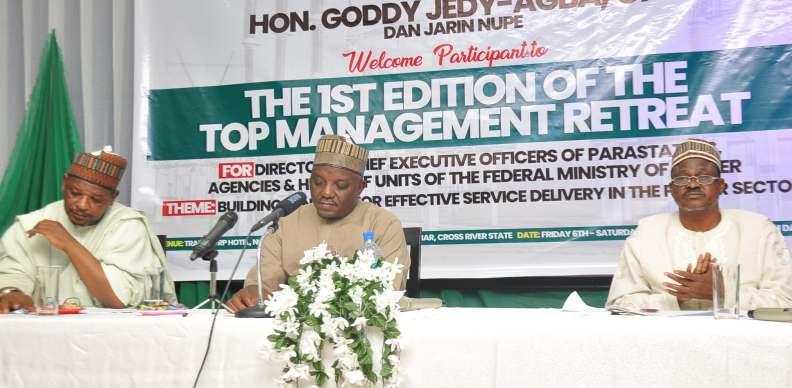
Directors,ChiefExecutiveOfficers of Parastatals, Agencies, and Heads of Units of the Federal Ministry of Power, themed “Building Synergy for Effective Service Delivery in the Power Sector', emphasized the need for synergy for effective delivery, noting that the objective of the
President Buhari administration to provide steady power supply will be hampered if stakeholders inthesectordonotworktogether.
He identified key areas that his ministry intends to address to achieve improved power supply, to include; “ensuring market liquidity and sustainability, addressing infrastructural misalignment between transmission and distribution, fast tracking implementation of FGN intervention projects such as the Mambilla Hydro Power Station, among others, increasing universal access to electricity servicesandstrengtheningsector coordination as well as providing
adequate policy direction". These areas, according to him, are critical to achieving the present administration's mandate of steadypowersupply.
Speaking earlier, the Minister of StateforPower,GoddyJedy-Agba called for the adoption of modern technology as relevant working tool for functionality in the ministry, adding that the sector needs to improve on capacity building.
Mr Jedy Agba, who identified power as the mainstay and most critical sector for economic development, implored top management of agencies in the
(L-R), Minister of State for Power, Mr. Goddy JedyAgba, Minister of Power, Engr. Sale Mamman andActing Perm. Sec, Ministry of Power, Engr AhmedAbu
TCN NEWSLETTER Transmission Company Of Nigeria 16
sectortodrawupandimplementa r o a d m a p f o r t h e f u l l computerization of the power ministryanditsaffairs.
On his part, the MD/CEO TCN, U. G Mohammed, made a presentation on “Sustainable Approach to Solving Power Supply Crisis in Nigeria”. He noted that low Gross Domestic Product (GDP), poor liquidity, lack of sustainable investments, weak national grid, emergency solutions, and poor planning are some of the challenges that still persist in the Nigerian Electricity Market (NEM), evenafterprivatization.
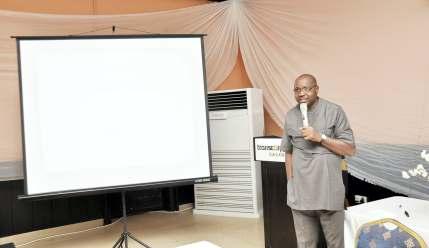
Speaking on the way forward, Mohammed called for the replacement of Single Buyer electricity model with bi-lateral agreement between Gencos and Discos for sustainable investments, adding that before the signing of any transmission lines contract, there must be a properstudyandevaluationofthe project, which would include proper feasibility study, Environment Impact Assessment Study (EIA), Resettlement Action Plan (RAP), and compensation of
people affected by Right of Way as well as competitive procurement tobringefficiencyintothesystem.
He further listed various transmission projects TCN is puttinginplacetosolveelectricity challenges in the most neglected parts of Nigeria through its Transmission Rehabilitation and ExpansionProgramme(TREP).He said that TREP will build a 330kV substationeach in Ikom and Ogoja to solve the issue of transmission interface in Calabar, replace the singlecircuitlinebetweenJosand GombewiththeEasternBackbone high capacity transmission line, complete the line between Ughelli and Port Harcourt, through
Yenegoa, build another quad line from Omotosho to Benin-North, closingtheloopbetweenAkangba and Alagbon, Okpai and Ughelli to makeitconsistentwithN-1.
The meeting, which provided opportunity for participants to interact and analyse critical issues that affect the sector came up with a communique which includes; the need for recapitalization of electricity distribution companies, provision of smart meters; the need for the Ministry to fast-track the effective implementation of “willing buyer, willingseller”policyofthepresent administration,amongstothers.
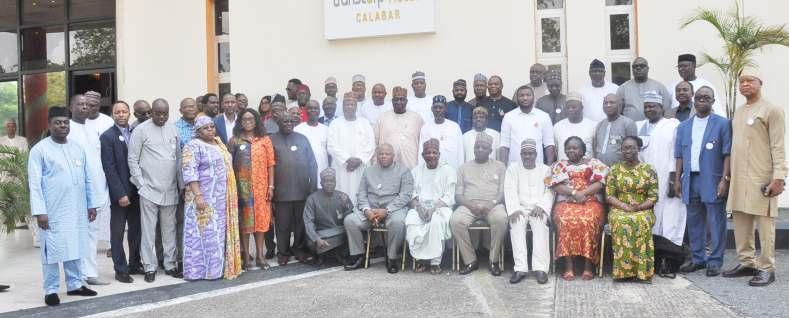 Group Photograph
MD/CEO TCN, Mr U. G Mohammed making a presentation
Group Photograph
MD/CEO TCN, Mr U. G Mohammed making a presentation
TCN NEWSLETTER Transmission Company Of Nigeria 17
THE WORLD BANK AND IMF DELEGATES
MEET WITH TCN MANAGEMENT TO DISCUSS POWER SECTOR REFORM, CHALLENGES AND WAY FORWARD
The Transmission Company of Nigeria, TCN, recently received some delegations from the World Bank and International Monetary Fund (IMF) at its headquarters in Abuja, to discuss the on-going reform in the sector, TCN achievements, milestones, challenges and plans towards achieving adequate bulk electricity supply acrossthenation.
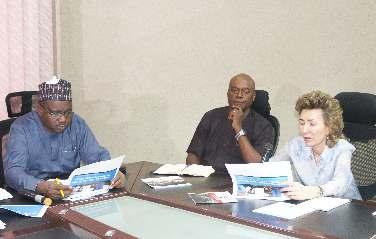
Natiya Kulichenko, who led the delegation from the World Bank, said that World Bank is willing to invest in Discos and TCN infrastructure According to her, comprehensive measures need to be applied to address the country's power sector situation in a sustainable manner She also suggested that TCN should supervise donor funds in the sector for proper utilization and grid stabilization; keep up with its grid expansion drive to further expand access to electricity; and ensure policy consistency as well as
regulatory clarity in the industry as these would all work to engender infrastructure development.
Meanwhile, the IMF delegation led by Amine Mati, who equally visited TCN to assess progress by TCN in rehabilitating and expanding transmission infrastructure nationwide, were pleased with TCN's achievements so far, and assured of their readiness and commitment towards further supporting infrastructure development in the powersector.
TheIMFteamurgedtheFederalGovernmentof Nigeria to support TCN and other critical electricity stakeholders by ensuring adequate implementation of rules and regulations of the Nigerian Electricity Market (NEM) to create an enabling environment in the nation’s grid expansion drive necessary for economic growth.
Speaking at the meeting, the MD/CEO, TCN, Mr. U.G.Mohammed,informedthedelegatesabout TCN’s efforts towards improving bulk electricity supply and repositioning the company nationwide He said that TCN managementistacklingthechallengesofRight of Way through collaboration with the state governments; ensures competitive procurement of projects and equipment; and has a well articulated 20 year least cost Transmission Expansion Plan. The first four years of that plan is being implemented under its Transmission Rehabilitation and Expansion Program (TREP). TREP, he explained, is aimed at rehabilitating, stabilizing, providing necessary flexibility, redundancies and expanding the wheeling capacity to 20,000MW by2023.
He disclosed that in the quest to achieve 20,000MW wheeling capacity by 2023, TCN has set out a four-point strategy which include; Frequency Control, Spinning Reserve, functional SCADA/EMS/ Telecom and critical investment in Lines and Substations, adding that TCN has recovered over 790 containers containing p o w e r e q u i p m e n t abandonedbycontractors at the ports TCN, he continued, had also c a n c e l l e d underperforming and abandoned contracts, and
(L-R), MD/CEO TCN, Mr. U.G Mohammed, Engr. Simeon Atakulu and Natiya Kulichenko, delegates from World Bank
the MD/CEO said that there is urgent need to recapitalize distribution companies if electricity consumers would benefit from TCN's efforts.
TCN NEWSLETTER
Stella Ejikonye
Transmission Company Of Nigeria 18
has used in-house engineers, at significantly lower cost to install 68 power transformers across the country.
Explaining further, the MD said that TCN engineers will be involved in reconductoring 132kV lines from Ikeja West – Alimosho – Ogba – Ota; from Onitsha – AwkaOji River; Aba – Itu; Birnin Kebbi - Sokoto and from Kaduna – Zaria – Funtua to Gusau. TCN, he said, is collaborating with donor agencies to finance some
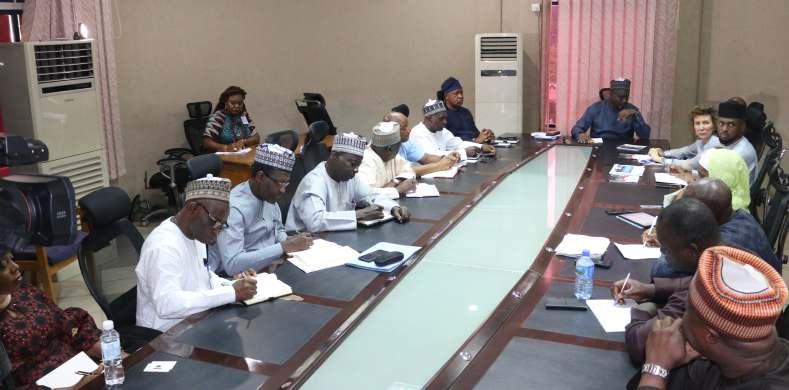
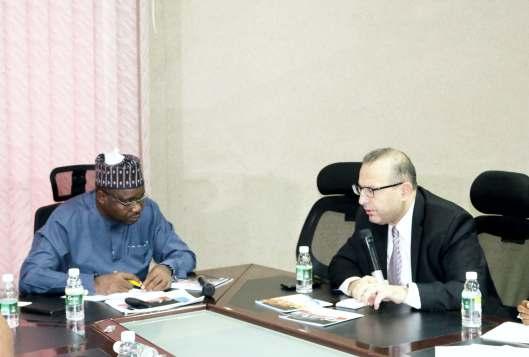
criticalTCNprojectsacrossthecountrywhichisyielding significantresults.
Having achieved some level of progress in its project implementationaimedatexpandingthegrid,theMD/CEO said that there is urgent need to recapitalize distribution companies if electricity consumers would benefit from TCN'sefforts.Thegovernment,theMD/CEOnoted,should invest 40% while the owners of the Discos should invest 60%ofthefundsforrecapitalization.
Participants at the meeting
(L-R), MD/CEO TCN, Mr. U.G Mohammed with delegates from IMF
The IMF team urged the Federal Government of Nigeria to support TCN and other critical electricity stakeholders by ensuring adequate implementation of rules and regulations of the Nigerian Electricity Market (NEM)
TCN NEWSLETTER Transmission Company Of Nigeria 19
CommuniquE
Issued at the end of the 1st edition of the Top Management Retreat on Saturday 7th December, 2019, at Transcorp Hotels, Calabar, Cross River State.
he First (1st) Edition of the Top Management
TRetreat for Directors, Heads of Units and Chief Executive Officers of Agencies/Parastatals of Federal Ministry of Power was held at the Conference Hall of Transcorp Hotels, Calabar on the 6th to 7th December, 2019 with the Theme 'Building Synergy for EffectiveServiceDeliveryinthePowerSector'.
2. The Retreat was presided over by the Honourable Minister,FederalMinistryofPower,Engr.SaleMamman. Also in attendance were the Honourable Minister of State, Hon. Goddy Jedy Agba, OFR (Dan Jarin Nupe), the Director Overseeing the Office of the Permanent Secretary (DOOPS), Engr. Ahmed Abdu (FNSE), Directors, Managing Directors/ Chief Executive Officers ofParastatals,andHeadsofUnitsintheMinistry.
3. The DOOPS welcomed participants and pointed out that the theme of the Retreat was chosen to encourage synergy and team spirit amongst the Ministry and its Agencies. According to him, the Retreat was to afford participants the opportunity to interact with one another and analyze critical issues affecting the Power Sector, with a view to proffering solutions and charting the way forward. He urged all Top Management staff to develop team working skills and positive attitude for effective task management. He appreciated the support and cooperationoftheGovernmentandgoodpeopleofCross River State for their hospitality and support towards the successfulhostingoftheRetreat.
4. In his Opening Remarks, the Honourable Minister of State reminded participants that the essence of the Retreat was to address the gaps in operational/ administrative relationship that exists between the MinistryanditsAgenciesandtoestablishagoodworking relationship for the implementation of Government policiesaimedatachievingtheMinistry'smandate.
5. In his keynote address, the Honourable Minister, Engr Sale Mamman, welcomed participants and thereafterdeclaredtheRetreatopen.
6. The Retreat received and discussed Four (4) presentationsasfollows:
i. ImportanceofEffectiveMeteringServicesinNigerian ElectricitySupplyIndustry(NESI);
ii. OverviewoftheRuralElectrificationAgency;
iii Building Synergy for Effective Service Delivery in the
PowerSector;
iv. Sustainable Approaches to solving the Power Supply CrisisinNigeria
RESOLUTIONS: At the end of the Retreat, the following resolutionsemerged:
1. There is need for recapitalization of Electricity Distribution Companies to reposition them for effectiveness,efficiencyandsustainability;
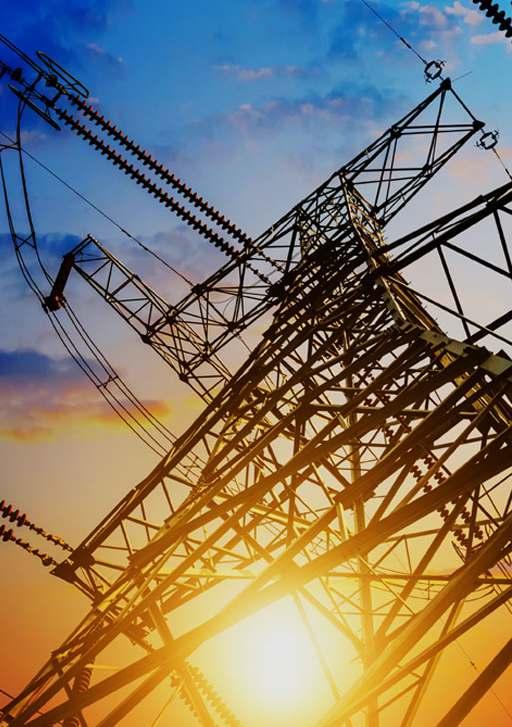
2. Provision of smart meters will forestall meter tampering, energy theft, improve collection efficiency and liquidityintheelectricitymarket;
3. The Ministry to intervene in the interpretation and clarification of the Electricity Power Sector Reform Act, 2005andNigerianElectricityManagementServicesAgency Act, 2015 regarding inspection, testing and certification of electrical installation in NESI with respect to the mandates of Nigeria Electricity Regulatory Commission (NERC) and Nigerian Electricity Management Services Agency (NEMSA);
4. The Ministry to intervene in ensuring that NERC releasesthestatutoryfundsforRuralElectrificationtoREA asprovidedforundertheEPSRAct2005;
5. To address the Synergy challenge, the Ministry and its Agencies are to ensure Coordination, Collaboration and Harmonization in the implementation of their core mandatesforeffectiveservicedelivery;
6. Policydirectives by the Ministryshouldbe continuously monitoredforeffectiveandefficientperformance;
7. Recognizing the Human Capital Development as the hallmark of efficient and effective performance, Departments and Agencies in the Sector are to ensure collaborationandalignmentwithNAPTIN.
8. To ensure better funding for effectiveness of training in the Power Sector Value Chain, there is the need to bring NAPTIN back as a Market participant under the Multi Year TariffOrder(MYTO).
9. There is a need for the Ministry to fast-track the effective implementation of the “willing buyer, willing seller”policyofthepresentAdministration.
TCN NEWSLETTER Transmission Company Of Nigeria 20
(middle)Amb. Godknows Igali
IGALI LAUDS TCN'S EFFORT AT INCREMENTALPOWER
By Gabriel Gandu
former Permanent
ASecretary in the Federal Ministry of Power,
Ambassador Godknows Igali has lauded the efforts of the Transmission Company of Nigeria (TCN), at improving bulk power supplyinthecountry.
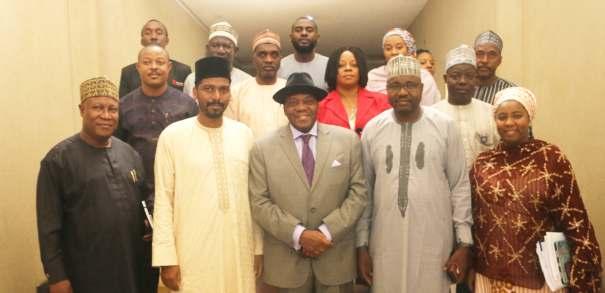
Ambassador Igali who recently paid a courtesy call on the management of TCN at its Corporate Headquarters in Abuja, spokeontheissuesbedevilingthe power sector despite much investments and efforts by the government, adding that with critical investment in all aspects of the sector, coupled with articulate planning, such as TCN's Transmission Rehabilitation and Expansion Program, the issue of solving the power sector challenges will no longer be a longtermissue.
He appealed to Nigerians to be patient with the power sector, and urged TCN to be more proactive in effectively communicating the ongoing reforms in the sector to clear public misconceptions. He
also called on all State and Local governments as well as
Community leaders to embrace the ongoing reforms initiated by TCNandassistTCNontheissueof RightofWay.Hesaidthattheissue of ROW was important as many projects have been stalled as a result of people building on transmissionlineroutes.
Speaking, the MD/CEO of TCN, Mr U G Mohammed expressed gratitude to Igali for his observations and comments, noting that TCN has comparative advantage in power generation across West Africa. He said there is need to strictly commercialize electricity business and cease making it a diplomatic issue According to him, with the launch of ECOWAS Regional Electricity Market in June 2018, and WAPP North Core project, Nigeria would beabletoexportelectricityacross W e s t A f r i c a , a n d w i t h commercialization, she will earn foreign exchange as well as createjobsforhercitizens.
Mr Mohammed reiterated the
need for Discos to match the huge investment TCN is making in the transmission grid, and called for therecapitalizationofthediscos.
On the issue of Right of Way, he explained that TCN collaborates with state governors and enters i n t o M e m o r a n d u m o f Understanding (MOU) with them. The MOU allows the governors executecivilaspectsoftheproject within their state to allow TCN concentrate on electro mechanical works This, he said, has helped TCN complete some projects in Nsukka and Nnewi, while discussions are ongoing with government of Jigawa, Imo, Ebonyi States etc, where TCN teams are currently scoping the projects.
TheMD/CEOexplainedthataspart of efforts to further expand bulk transmission of electricity, TCN is procuring an online regeneration machine which would be used to recover some old transformers. The recovered transformers would be sent to low density communities.
TCN NEWSLETTER Transmission Company Of Nigeria 21
14th WAPP
GENERAL ASSEMBLY IN PICTURES
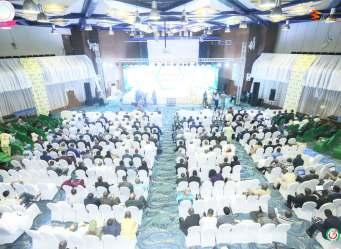
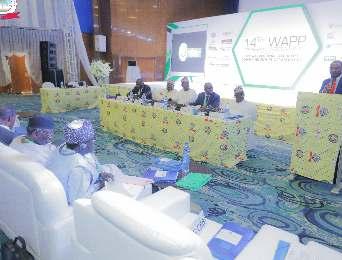
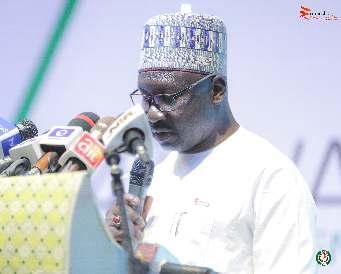
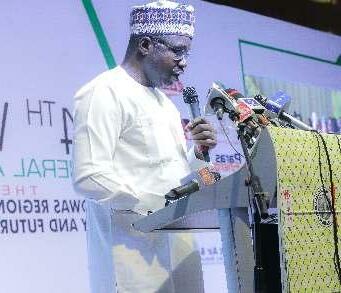
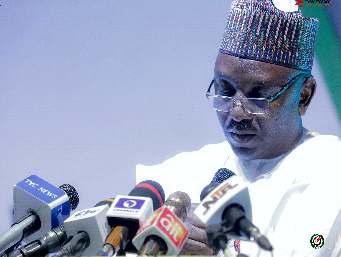
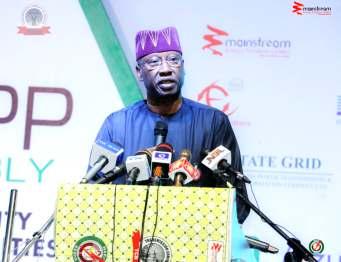 Cross section of delegates
Secretary to the Government of the Federation (SGF), Mr. Boss Mustapha
Minister of Power, Engr. Saleh Mamman
Chairman WAPP and MD/CEO TCN, Mr. U. G Mohammed
MD Mainstream Energy, Engr. Lamu Audu
During WAPP General Assembly
Cross section of delegates
Secretary to the Government of the Federation (SGF), Mr. Boss Mustapha
Minister of Power, Engr. Saleh Mamman
Chairman WAPP and MD/CEO TCN, Mr. U. G Mohammed
MD Mainstream Energy, Engr. Lamu Audu
During WAPP General Assembly
TCN NEWSLETTER Transmission Company Of Nigeria 22
14th WAPP
GENERAL ASSEMBLY IN PICTURES
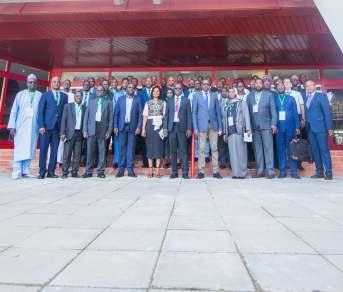
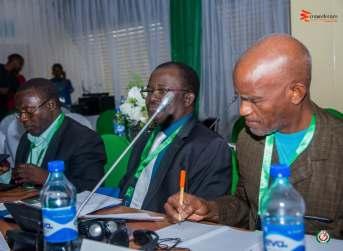
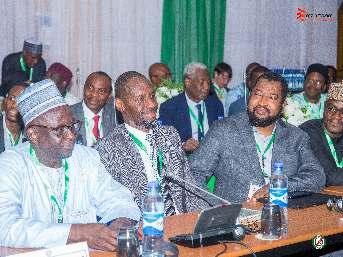
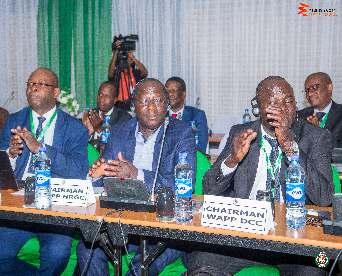
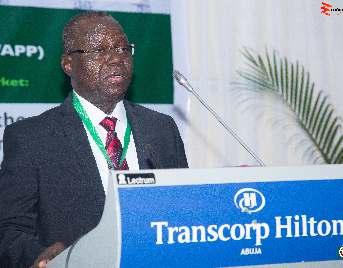
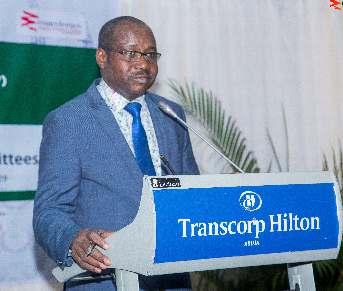
OPENING SESSION
Delegates
Delegates
WAPP Chairman and MD/CEO TCN, U G Mohammed
Secretary General WAPP, Mr. Siengui Ki
Delegates
Group photograph TCN NEWSLETTER Transmission Company Of Nigeria 23
14th WAPP
GENERAL ASSEMBLY IN PICTURES
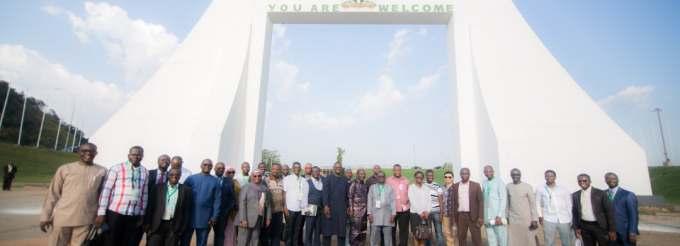
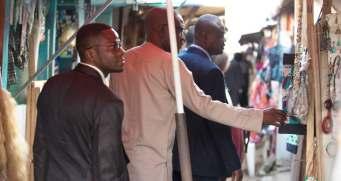
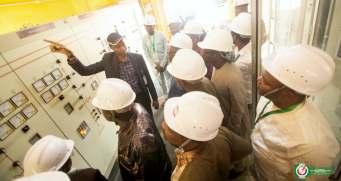
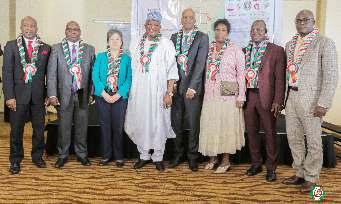
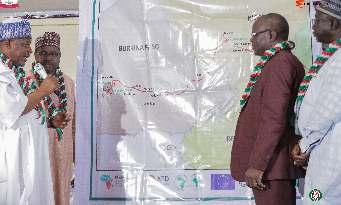
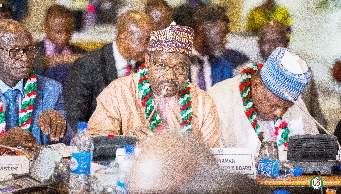
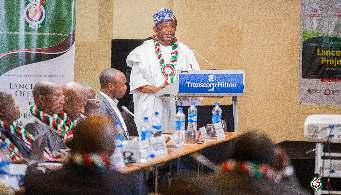 Delegates visit Katampe Substation and other sites in FCT Abuja
Minister of State, Power, Goddy Jedy Agba
Chairman WAPP and MD/CEO TCN, Mr. U. G Mohammed
Minister of State, Power, unveils WAPP North Core Project Group photograph
Katampe Substation
Arts and Craft Village
City Gate
Delegates visit Katampe Substation and other sites in FCT Abuja
Minister of State, Power, Goddy Jedy Agba
Chairman WAPP and MD/CEO TCN, Mr. U. G Mohammed
Minister of State, Power, unveils WAPP North Core Project Group photograph
Katampe Substation
Arts and Craft Village
City Gate
TCN NEWSLETTER Transmission Company Of Nigeria 24
Launch of WAPP North Core Transmission Line
ELECTRICITY:
KEY TO SUSTAINABLE DEVELOPMENT AND SECURITY -BORNO STATE GOVERNOR
By Stanford Nneji
Babagana Zulum, recently paid a courtesy visit to the management of Transmission Company of Nigeria (TCN), at its Corporate Headquarters,Abuja.
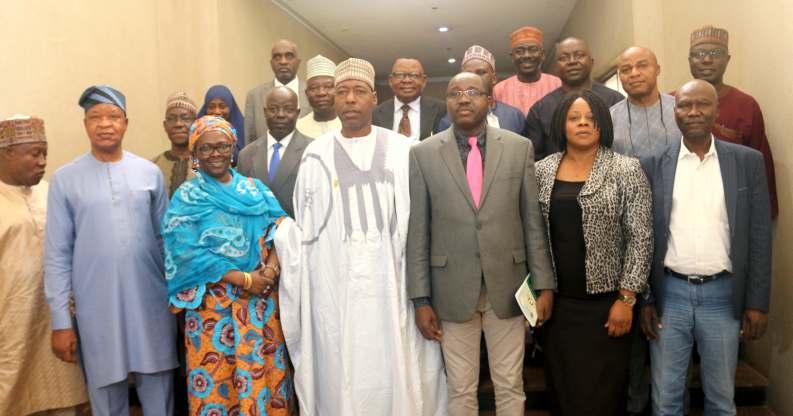
During the visit, the Governor expressedappreciationtoTCNfor the enormous support and sustained effort to ensure power supply to the region despite the destruction of about 780 power lines and other infrastructure by insurgents.Helamentedtheacute humanitarian crisis triggered by insurgency with the attendant devastation of the socio economic life of the people of Borno State, and opined that the root cause of insurgency must be addressed if there is to be any form of sustained growth in the region.
The Governor said that his visit was to seek greater collaboration with TCN in an effort to boost electricity supply to the state, stating that electricity supply is crucial for the economic recovery and development of Borno State. He noted that adequate power supply would significantly impact agricultural industry in the state as well as provide huge employment opportunities for the people.
He suggested the use of other alternative energy sources like solar, wind etc to further increase energy in the state in the near future.
Speaking earlier, the Managing Director of TCN, U. G Mohammed, lauded efforts of the Governor in rebuilding the state after the devastations by insurgents. He notedthatthegovernoristheright persontogovernthestatejudging byhisachievementssofar,aswell
Mr Mohammed informed the governor that TCN has secured the sum of $1.661 billion from multilateral donor agencies to strengthen the transmission grid in Nigeria and that the rehabilitation and expansion of the grid would include the transmission system in Borno State.
He also informed the governor that TCN is building three additional 330kV substations in the Northeast to increase transmission capacity in that axis, and that plans were underway to secure $200M from AfDB to further increase capacity in Borno,AdamawaandYobeStates. Electricity, he said, will go a long way in solving security issues in Borno State. He pledged TCN's commitment to working with the Governor to ensure that the state's electricity problems are resolved.
The Borno State Governor, His E x c e l l e n c y , P r o f e s s o r
ashisintoleranceforcorruption.
TCN NEWSLETTER Transmission Company Of Nigeria 25
TCN Meets EKO and IKEJA DisCos on Areas of Cooperation for More Efficient Power Supply in Lagos State
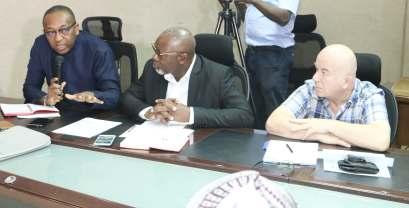
The Transmission Company of Nigeria (TCN) has commencedaseriesofmeetingswithdistribution companies with the aim of identifying areas of cooperationandresolvinginterfaceissues,toengender moreefficientsupplytoelectricityconsumers.
In one of such meetings, the Managing Director of Eko Electricity Distribution Company (EKEDC), Adeoye Fadeibi, listed locations with electricity supply constraintswithinhisnetworkandsuggestedwaysTCN couldintervenetoresolvethem.
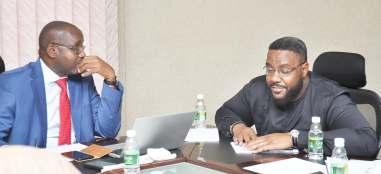
He disclosed that EKEDC has set up a committee chargedwiththeresponsibilityofanalysingmediumand long term challenges and to plan alongside TCN for the attainment of overall success of steady power supply in their franchise area He added that "we are all together inthis,ifwearenotworkingsidebysideandifourplans are not lining up, then it's all going to be a lot of failed projects".
Speaking at the meeting, the MD/CEO of TCN, U. G. Mohammed, expressed delight with the outcome of the meeting and noted that the meeting was scheduled based on analysis made on the EKEDC network which reported projections, strategy and areas of constraints where TCNcouldcomeinandprovidesolutions.
He described the meeting as strategic as challenges, restrictions and constraints were identified, and commitments were made to resolve the challenges within immediate, short and long term projections.
He also noted that EKEDC has
By Kazah Bili Akau
demonstrated a high level of commitment to improving its service delivery which is why TCN wants to work more closely with them to eliminate constraints within their franchise area, and implored EKEDC to look into the issue of equipment protection especially on their 33kV and 11kV lines to eliminate the threat of damage to TCN's equipment. He said that injection substations are necessarytocheckmatefaultsonTCNtransformers.
Mohammed further explained that EKEDC’s report indicated that between 2019 to 2024, they would likely have interface constraints in Isolo and Lekki. For Lekki, theMDsaidTCNisbuilding330kVand132kVsubstations in Badagry to serve the area. In Isolo, even though TCN hasnorecordofincreasedofftakebyEKEDC,TCNwould providea60MVAmobiletransformertofurtherincrease itscapacityatthesubstation
Similarly, the Managing Director of Ikeja Electricity Distribution Company, IKEDC, Mr. Anthony Youdeowei and his team, met with TCN management on 10th December, 2019, to discuss areas it requires TCN's immediate intervention and to agree on proactive steps toresolveidentifiedchallenges
Ikeja Disco team led by the MD Mr. Anthony Youdeowei
(Left) MD/CEO TCN U.G Mohammed and MD EKEDC Mr Adeoye Fadeibi
we are all together in this, if we are not working side by side and if our plans are not lining up, then it's all going to be a lot of failed projects
TCN NEWSLETTER Transmission Company Of Nigeria 26
EXCLUSIVE INTERVIEW WITH
U.G MOHAMMED MD/CEO TCN
To cap the year 2019 in preparation for 2020, TCN’s Transmission New Crew spoke with the MD on trending issues during the outgoing year and the next steps in year 2020
reserveissupposedtobefinancedbythe ElectricityMarket.
On Critical investment in lines and substations, we used in-house capacity to install and commission over 68 power transformers nationwide, recovered 790 out of over 800 containers that were stranded in the Ports, some of them for over 10years For underperforming contractors, we took over some contractsandcompletedthemusingTCN staff. We also approached international donors and have so far raised $1.661b for investment in TCN, the projects are at various stages of implementation Although we have worked very hard, we won't say we have solved all the problems of transmission, but transmissionisreallynottheproblemof the power sector anymore, we have reversedthattrend.
TCN Under Your Leadership TCN Launched The 20 Year Least Cost Transmission Master Plan In 2018, And Extracted The Four Year Transmission Rehabilitation And Expansion Programme (TREP), How Has The ImplementationBeenSoFar?
Whenwecamein2017,transmissionwas the weakest in the power value chain, we needed to do something to remove TCN from that position. We quickly ensured that the 20year Least Cost Transmission Expansion Plan was completed and delivered in December 2017 by Messers Fitchner. We then came up with a 4 year plan out of the 20year plan which is the Transmission Rehabilitation and Expansion Programme (TREP). TREP has the objective; to expand the grid to
20,000MW by 2023 and has a four point strategy: Frequency Control, establishing a functional Supervisory Control and Data Acquisition (SCADA), achieving Spinning Reserve, which is a key requirement for stability of the Grid and ensuring critical investments in LinesandSubstationsconsistentwithN1reliabilitycriteriaacrossthecountry.
On SCADA, we have done a lot of work and are gradually putting in place strategies that will enable us have a functional SCADA On the spinning reserve, we have procured 260MW, which is awaiting approval from the Nigerian Electricity Regulatory Commission (NERC). Presently, NERC is looking into funding it because spinning
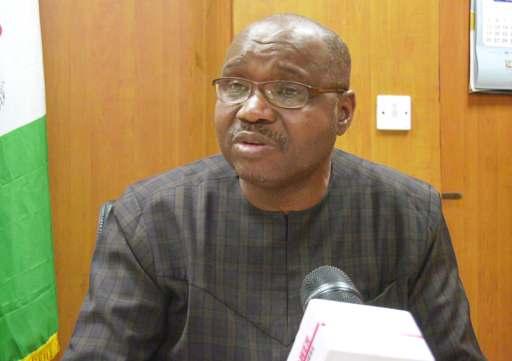
EarlyThisYear,TCNFlagedOffTheAbuja Ring Project, What's Your Evaluation Of TheProjectSoFar?
Abuja wheeling scheme project comprises five new substations in Abuja and a new 330kV transmission line supply route from Lafia to Abuja. TCN staffcompletedallthestudiesbeforethe contract was awarded. Before now, contracts are awarded without completing all the studies but this time, we completed all the studies, paid the compensations for the Right of Way (RoW), before we launched the process. So the implementation of that project is on track. We are working to deliver the substations and a new transmission line supply route to Abuja which would make
Transmission Company Of Nigeria 27
Abuja consistent with N-2 criteria in terms of330kVtransmissionline.
How Far Did TCN Go In Sustaining Frequency Control And The SCADA ImplementationProcessIn2019?
We have achieved a significant level of stability as at today, all generators connected to the grid are now on free governor control mechanism This is significant, but we still have the problem of matching demand and supply especially whenitrainsthereisusuallysuddendropin load because of the poor network of the DisCos.
On SCADA/EMS, we have also launched the procurementofCriticalOpticalGroundWire (OPGW)forthefewareasnotcoveredunder TREP. All our lines are going to have OPGW afterwhichwewillcloseallcommunication backbone to make it possible for us to have a functional SCADA. We have selected 15 staff of TCN and commenced training them extensively. We have sent them to Ghana, and sent a team to Brazil to learn how automation is done and have equally commenced the procurement of a SupervisoryConsultant.
We have also finished the design for the controlroom;adaptedthePJMmodelofone National Control Center with two Work CentersinOsogboandShiroroandtheyare going to work real time in synchronism. All these are in readiness for the launching of SCADA.Wehavealsoprocuredacontractor for the AMR (Automatic Meter Reading) which is also a component of SCADA. The implementation of the project is going on smoothly.
How Many Transformers And Substations DidYourCompanyCommissionThisYear?
I cantellyou from2017to Octoberthisyear, we have installed and commissioned 68 powertransformersacrossthecountryand the least among them is the 30MVA transformer installed in Gombe. The rest of them are 60MVA and above. It's no longer business as usual, any contractor that refusestodowhatheissupposedtodo,we cancelthecontractandtakeoverthejobby ourselves and complete it. When we did the last simulation of the grid which was in
December 2018, the grid moved from 5,500 to 8,100. Our intention is to reconductor and build more transmission lines. There are some areaswherewehavehightransformer capacitybutthelinethatwillgivethem powerisnotadequate.Wearegoingto reconductorsuchlines.
Someofsuchlinesincludetherecently launchedIkejaWest–Alimosho-Ogba to Ota transmission line and we also want to do the Birnin-Kebbi to Sokoto and Ituaba to Itu line; the OnitshaAwka, Awka - Oji River and the Kaduna-Zaria- Funtua lines among others. Once we reconductor these lines, we will recover significant capacitythathadbeenlimited.
Afterwards, we will simulate the Grid capacity again and this will clearly move our capacity well above 10,000MW. If you look at the recent study carried out by Ikeja and Eko DisCos, it vindicated our position that thetransmissioncapacityismorethan 8,100MW because according to the report, the operational capacity of the two business units is almost about 4,000MW, so we are looking at almost 25% of the capacity we have in Nigeria in Lagos, that means that what they have reported showed that we are far wellaheadofwhatweprojected.
You Often Emphasise The Need For Capitalisation Of Distribution Companies (DisCos), Do You Still Hold ThisView?
Of course, if you look at the current situation,transmissionwillcontinueto expandandwillnotwaitfortheDisCos because transmission infrastructure is more difficult and expensive to build and takes longer time than DisCos infrastructure. Many of the equipment used by Distribution are manufactured in Nigeria, but most transmission equipment are manufactured outside N i g e r i a a n d t r a n s m i s s i o n infrastructures require bigger Right of Way (RoW) and that is very expensive. Welookattransmissionasanenabler,
and so anytime government takes a decisionordistributioninvestorsbecome serious,theycanfixtheDisCos.Nigerians will not get the benefit of transmission gridexpansioniftheDisCosarenotfixed.
Secondly,weareconnectedtotheDisCos andsoprotectionisveryimportant.Outof the 738 interface connections we have with the DisCos, only 421 have protection on their side. The remaining 317 have no protection. This means that fault in people's house can easily hit TCN transformersandspoilit.Thetheproblem ishowdoyouenforcemandatorybuilding of injection substations when the DisCos don't have money? So we need to recapitalise the DisCos so that they will have funds to fix their network and provide meters that would reduce their aggregate commercial loss. The industry can only work well when all the players are working. Capitalization will lead to a situation where we have stronger companieswithbettermanagement.
HowHasIncreaseInCapacityOfIn-house Engineers,TranslatedToBetterService?
Engineeringisaboutconfidence.Whatwe do is to give TCN engineers confidence to do their job and that is whythey are doing things they haven't done before. A few weekstotheelection,welosta150MVAin Kano and mandated TCN engineers to fix the transformer before election. They successfully repaired and energized it two weeks before the election. In Ilashe, TCNengineersbuilta132kVsubstationon an island on their own. We challenge our engineers, because that is the only way they can improve and become proficient. We had a 150MVA transformer that got spoilt in Asaba, before, we pay contractors to fix it but now, TCN engineers have almost completed the project An Engineer that is not empowered cannot be innovative and be at his best, we are training them. We collaborated with APUA, and trained 306 engineers with National Power Training Institute (NAPTIN), we have conducted several hands-on in-house training and have equally had them trained in specialized areas. We plan to bring other
TCN NEWSLETTER
Transmission Company Of Nigeria 28
experts to also train them. We are working very hard to ensure that we position the organization to deliver on its mandate in thepowersector.
In 2020, we will continue to push our engineers to steadfastly implement TREP and emphasize massive training to enable us fix our challenges with limited recourse to third parties. We will build transformer repair workshops and the recently recruited 200 new engineers would start their pupilage programme where they will be mentored by other qualified engineers. We are working to see that all the projects that we have under TREP are implemented in a sustainable manner and we will keep pushing for the recapitalization of the DisCos. Recapitalization would move the power sector to sustainable growth and development. The power sector has to attractinvestmentandtheonlywaywecan have investment is to ensure that it is sustainable, meaning every party is working with the regulator providing cost reflective tariff that is consistent with the position of ECOWAS. Presently, TCN is the only agency in the power sector that has adaptedtheinvestmentregulationofNERC whichrequiresalllicensestoprocuretheir equipment, supply and install them in a competitive selection process We advertiseallourprocurementneeds.
Sir, Is TREP Implementation Still On Course?
Of course, TREP is still on target, we are stilloncoursebecausetheimplementation of TREP has not derailed, we are pushing aheadtoensurethatwecontinuetostayon track. But we have the challenges of Right of Way and some of them require huge amount as compensation The state governments are however giving us all the necessarysupport.
As The Chairman Of WAPP, What Are The SuccessesOfWAPP
WAPP is an Agency of ECOWAS that is financed by power utilities within member states. It's the only agency that is not dependent on ECOWAS for financing and Nigeria has always played a critical role in the formation and management of WAPP.
Under my leadership as a chairman of WAPP,wehavedonealotofthingsthat Icantellyou.
Under my leadership, NAPTIN became Center of Excellence; we resolved the problem of the North Core Project that will build a 330kV double circuit line connecting Nigeria, Niger, Burkina Faso and Benin and we also established the implementation structure which is housed here in Nigeria. We successfully delivered the West Africa Power Market, which we launched in June 2018, with the ECOWAS Regional Electricity Regulatory Authority (ERERA) Chairman in Cotonu. We started the first stage, we are looking forward to thesecondstage.
We have also concluded the Generation and Transmission Master Plan for ECOWAS which was approved bytheECOWASHeadsofStatesintheir meeting held in December 22nd 2018 and that master plan looks at expansion of Generation and Transmission infrastructure from 2019 to 2033 One of the priority programmes in that masterplan is the Eastern Backbone, which is the 330kV line that will start from Calabar – Ikom – Ogoja - Kashimbilla – Mambilla –Yola – Hong – Biu – Damaturu –Potiskum – Azare - Dutse and to Kano. That line will solve the problem of criticalinfrastructuretotheNorthEast because the area currently receives supplyfromonesinglecircuitlinefrom Jos to Gombe. In Cross River State, fromCalabartoOgojaisabout10hours, yet from Calabar to Ikom to Ogoja, there is no single transmission infrastructure. This project will build 330kV Substation in Ikom and Ogoja. It is critical to enabling areas that are
most neglected in terms of electricity in Nigeria. We are happy that this is part of WAPP priority project and are working tirelessly to ensure that it becomes a reality.Weareequallyworkingtowardsa situation where we can actually have a proper trading in electricity, where electricitycanmovefromareasthathave excesstoplacesthatdonothaveenough.
Nigeria can benefit from electricity trade because we can establish generation plants here and sell electricity to other countries. This will generate foreign exchange and employment. Under the newgenerationandtransmissionmaster plan of ECOWAS, a 330kV line will run fromNigeriatoSenegalwherethecostof Energy is very expensive and to other partsofWestAfrica.
Today, WAPP has achieved success in connecting 9 out of the 14 countries in West Africa. The remaining five will be connected when the new line between Coted'ivoire - Sierra-Leone - Liberia and Guinea is completed. Another line would be built from Senegal – Gambia - Guinea Bissau and to Mali. These lines will be completed next year, that means all the 14 countries will be connected. The new master plan will establish a 330kV line from Nigeria to Senegal which is also anothersignificantachievement.
What Are The Expectations From The RegionalMarketIn2020?
The only way Nigerians can benefit from WAPP is for us to implement the ERERA Regulation. First of all, we have to allow, at this stage, bilateral contract to continue; allow people that generate electricity in Nigeria to sell to energy users in other countries in West Africa. That is the only way we can benefit from the market. If we allow government to operate the market, they will continue to subsidizeelectricity.Fromthepositionof WAPP,wearegoingtobepushingforthe implementation of sustainable electricity market for WAPP, we are also going to push for the next stage of WAPP Electricity Market, which is a full liberalization of the electricity market in WestAfrica.
TCN NEWSLETTER
The only way Nigerians can benefit from WAPP is for us to implement the ERERA Regulation.
Transmission Company Of Nigeria 29
TCN AWARDS ENGINEERS CERTIFICATE FOR OUTSTANDING PERFORMANCE
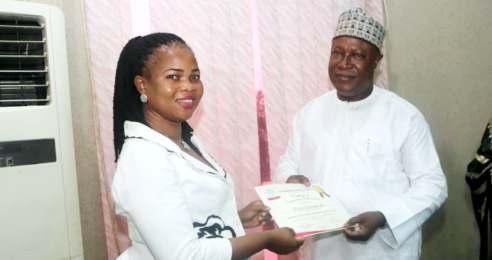 By Grace Sambe-Jauro
By Grace Sambe-Jauro
TheManagementoftheTransmissionCompanyof Nigeria (TCN), has presented Certificates of Outstanding Performance to 11 (eleven) engineers after a recently concluded System Operations Engineers' Development Programme –Module1Batch1trainingheldinOsogbo,OsunState.
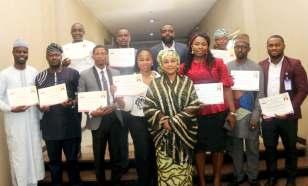
The Managing Director/CEO of TCN, Mr. Usman Gur Mohammed who was represented by the Head ISO, Engr. Maman Lawal, presented the certificates to the engineers on Tuesday 22nd October, 2019, at the TCN corporate headquarters in Abuja. Engr. Lawal, who expressed satisfaction with their performance, revealed that management is encouraged to train more staff, adding that the engineers are expected to be part of pacesetters of high standards within their departments.
Inhisspeech,theEDHR,Barr.JustinDodocongratulated the engineers for having distinguished themselves during the period with very commendable performance, addingthattherecognitionisawayoftellingthemnotto rest on their oars as the practical implementation of all they have learnt is expected. He further told them that having distinguished themselves, the reward for excellent performance is more work and encouraged them to ensure that they affect not only TCN, but the powerindustryasawhole.
Speaking on behalf of the awardees, Engr. Ibrahim Aliyu commended the management of TCN for such intensive handsontraininginitiative,addingthatafterthetraining, theyareeagertogobacktowork,andwouldnotrelentin practising what they have learnt. He appealed to management to carry out more of such intensive trainings for all staff in every department in order to growamoreefficienttransmissioncompany.
The awardees include Mr. Aziagba Daniel Emeka from Abuja Region, Mr. Bemdoo Saka, TCN CHQ, Mr. Soroh Ebitari, Port-Harcourt Region, Mr. Ijeh-Ogboi Christian, Benin Region, Mr. Ibrahim Aliyu, Abuja Region, Mr. Dada Oluwagbenga Abiodun, NCC Osogbo, Mrs. Akaeze Chiamaka, Enugu Region, Mrs. Nwadike Ijeoma Mary, Enugu Region, Ms. Fatima Abba Hamza, Shiroro Region, Mr. Gyang Philip Pwajok, Benin Region and Mr. Bako YusufYila,GombeRegion.
Group photograph of the awardees with their certificates
TCN NEWSLETTER
Engr. Maman Lawal, Head ISO, presenting certificate to one of the awardees
Transmission Company Of Nigeria 30
TCN, MAINSTREAM ADVOCATE FOR SUSTAINABLE GROWTH OF THE POWER SECTOR
By Uloma Osuagwu
The Transmission Company of Nigeria (TCN) and Mainstream Energy Solutions Limited (MESL), in conjunction with other Nigerian Electricity Industry Stakeholders, staged an electricity awareness walk to sensitise electricity consumers on the need to play their part in the quest for sustainablegrowthofthepowerindustry.
Addressing participants after the walk, the MD/CEO TCNandChairman,WestAfricanPowerPool(WAPP), U G Mohammed, emphasized the need for all Nigerians to see sustainable development and growthoftheNigeriaElectricityIndustryasanational issue. He solicited for liberalization of the power sector through non-partisan consensus where all players in the sector must understand their roles, withadequateinvestmentplanningandtransparency gearedtowardsfixingthesector.
Mohammed refuted recent reports that the nation's electricityindustryisnotmovingforwarddespiteongoing investments in the sector, pointing out that there has been significant improvement in electricity service delivery with various areas experiencing more hours of supply. He noted that the TCN’s wheeling capacity has increased from 5,000MW to 8,100MW as recorded in December 2018 and that
distribution capacity has equally moved from 3,500MW in2015to5,375MWasatFebruary2019,whilegeneration capacity rose from 4,000MW to 7,500MW He emphasized the need for more investments, to ensure sustainedgrowthinthepowersectorvaluechain.
The MD/CEO TCN, urged all key players as well as consumers in the industry to understand their role and playtheirpartinensuringthegrowthoftheindustry.He pointed out that some consumers often directly or indirectly contribute to poor development of the sector through vandalism of power infrastructure, building underpowerlines,onTransmissionRightofWay,meter by-pass,andrefusaltopayforelectricityconsumed.He further noted that under-capitalisation, liquidity crisis, regulatory inconsistency, inadequate supply of electricity to consumers as well as lack of careful investment planning are factors that have equally hamperedthegrowthofelectricityindustryinNigeria.
The Managing Director of MESL, operators of Kainji and Jebba Hydro Power Stations, Engr. Lamu Audu on his part, assured Nigerians and particularly electricity consumers that the industry is ready and fit to provide reliable and affordable electricity. He said, “we are looking up to the government for support, workers in thesectorarereadytowork”.
The awareness walk which was to usher in the 14th WAPP General Assembly in Abuja, witnessed a large turnout of staff from various power agencies in Abuja, displaying banners with inscriptions such as; “Stop building under power lines,” “Recapitalise the industry,” “Stop electricity theft,” “Pay your electricity bills promptly,”and“Don'tvandalisepowerequipments”.
Also in attendance were the DG NAPTIN, Mr. Ahmed Nagode,GMHR,AEDC,Mr.JosephAdeniyi,representing the MD/CEO AEDC, and Engr. Tasiu Wudil amongst others.
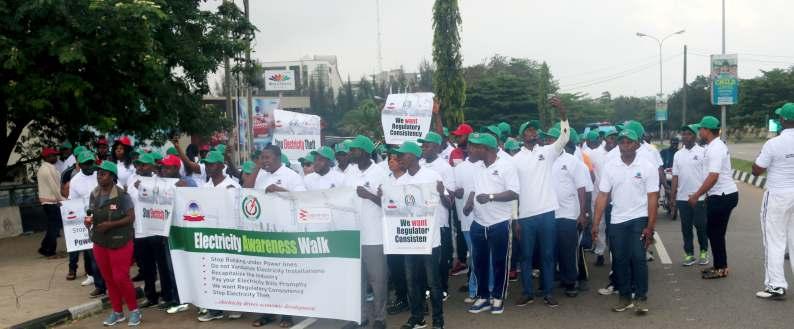 Cross Section of staff from power agencies in Abuja
Cross Section of staff from power agencies in Abuja
TCN NEWSLETTER Transmission Company Of Nigeria 31
POWER SYSTEM FREQUENCY CONTROL
1.1 INTRODUCTION
PowerSystemsareaninterconnectionofgenerators andloadcentersthrough transmissionnetworks,to move power from the generators to end users. To achieve this, several apparatuses are used from generatingplants,transformers,transmissionlines, capacitor banks, switch gears, circuit breakers and insulators to achieve the task of moving power from generator sources to end users. These physical apparatuses must be controlled and operated within certain limits dictated by the laws of physics. Apart from scientific constraints, apparatuses must also be operated within the engineering bounds of the systemandrulesandguidelinesofcooperationinan interconnected and interdependent system. The science, art and engineering of achieving this is calledSystemOperationsinPowerSystems.System Operations is carried out by an entity commonly referredtoasSystemOperator.
The System Operator ensures that engineering, systemandphysicslimitsarerespectedthroughthe control of certain observable and measurable variables.Itcollects/acquiressomesetsofvariables and processes these variables to produce a set of control actions. Two of the most versatile variables used for control actions is the System Grid FrequencyandapparatusesVoltages.Ofthetwo,the System Frequency has a unique feature of being (mostly) the same across all grid apparatuses and endconsumerdevices.
12 FREQUENCYASABALANCINGVARIABLE
The high voltage grid is made up of Generators and load interconnected through the transmission network. The amount of generation put out into the grid must constantly be balanced with the amount of load and system losses in other to achieve a stable generation frequency regime. The frequency of the grid system is directly related to speed of rotation of the generators turbine/rotor systems. There is a nominal desired frequency for the grid to operate. The nominal desired frequency is achieved when load is exactly equal to the generation as depicted in Figure 1; while the desired nominal frequency is not normallyreached,slightdeviationarepermissible.
Figure 1: Depiction of nominal frequency when generationequalsload
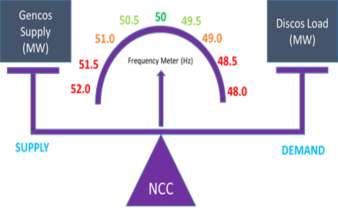 By Engr. Seun Amoda
By Engr. Seun Amoda
The MW difference between total generation and total load is a function of the frequency (speed of machine rotation). As a result, the frequency is used as a primary control of the electricity. When load exceeds the generation, frequency decreases and frequency increases when generation exceeds the load. Frequency deviations also affect the speed of machines.Whenloadexceedsgeneration,frequency
decreases and the generator turbines/rotor system speed decrease as depicted in Figure 2. And when generation exceeds load, frequency increases and the generator turbines/rotor system speed increase as depicted in Figure 3. System frequency is directly linked to the speed of rotation of the generators. When the load on the grid increases, the grid frequency decreases in line with the decreasing speed of rotation of the generators. Due to the fact that generator turbines are sensitive to frequency changes,generatorsareusedastheprimarytoolsto control frequency deviations Generators are required to move up or down to provide the energy balance required to restore grid frequency to (near) nominal range Load adjustment (Demand Resources) can also be used to correct frequency deviations, but they are very slow to respond to control actions and MW adjustments are not as precise as Generation control actions. Typically load are very slow in response to change requests, so generators are the preferred method to remediate frequency imbalance because of their fast acting responses. However load are seldom for control of the system frequency balance in a scheme called demandresponse.
TCN NEWSLETTER
Transmission Company Of Nigeria 32
Figure 2: Depiction of frequency Imbalance due to load increase (or generation decrease)
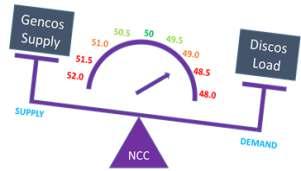
grid frequency reduces (increases) and generator rotor decrease (increase). Generators with turbine governors sense this frequency decrease and response by increasing their power output to try to restore the frequency back to its nominal value. Usually this restoration function is shared by all the generators in proportion to their sizes. The instantaneous control of demand supply balance by turbine governors of generator is referred to as primary frequency control or automatic generator control.Whileinstantaneouscontrolactionofturbine governors prevents system collapses for small deviations,itdoesnotusuallycompletelyrestorethe frequency to its nominal value. The System Operator sends new baseline generation values to different plants to attempt to restore the system frequency to its nominal point based on Area Control Error (ACE) techniquesusingsecondaryreserves.
2. FREQUENCYCONTROLTYPES
Figure 3: Depiction of frequency Imbalance due to generation increase (or load decrease)
1.3 IMPORTANCEOFFASTACTINGACTIONS
INBALANCINGTHEGRID
Large deviations from the nominal frequency, when not corrected quickly, leads to cascading blackout or system collapses. Wide frequency deviations, especially ones outside the statutory limits, can be damaging to mechanical and electrical components of generators, so generators are designed to take self-protective action by shutting down at abnormal frequencies. Once a generator shuts down, others will follow because the deviation will be worse after the first shut down. This phenomenon is known as cascading blackout or grid collapse. A total collapse is the complete shutdown of the transmission network where all the generators shut down one aftertheotherandapartialcollapseistheshutdown ofpartsofthegrid.
Large deviations can be caused by unplanned large load addition to the grid, tripping of lines and generators due to (designed and inadvertent) protective relay action and unscheduled generation addition.
1.4 BASECONTROLACTIONS
When the load on the grid increases (decreases), the
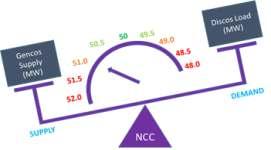
There are various ranges of frequency control actions based on control time frame and control mechanisms. These control actions are discussed below.
2.1 INERTIARESPONSE
When there is change in load or generation, all the turbine generators adjust the kinetic energy stored accordingtotheirrotatingmass.Ifthereismoreload, kinetic energy is taken from the rotating mass of the turbine and if there is less load kinetic energy is absorbedbytherotatingmassofturbines.Theinertia response is immediate and can be considered the turbine'sinstantaneouskineticenergyadjustmentto frequency changes This frequency control mechanismisadynamicnaturalresponseofrotating machines. All well-built and suit-for-operation generatorturbinesshouldhavethisservice.
2.2 PRIMARYFREQUENCYRESPONSE
Primary frequency response is response to frequency deviations based on detection of such frequency deviations by turbines and immediate control action by turbine governors to remediate the deviation. Primary frequency response is (almost) instantaneous and must be sustained for few minutes. Primary frequency response are important to remediate deviations and stabilize the system (prevent grid collapse) until secondary and tertiary response become active. In power systems it is very important that absolutely all turbines provide
TCN NEWSLETTER Transmission Company Of Nigeria 33
primary frequency through their governors; the provision of this service is very important for stability of the grid and prevention of system collapses. The turbine governors adjust generator output to counteract the deviation and bring the frequency back to its nominal value as close as possible. When all generators in a system provide primaryfrequency,theamountofprimaryfrequency response obtained from them will be negligible. Moreover, it is an up and down movement that (is supposed to integrate) integrates to zero at the end of a dispatch period or operational day. As a result it should be provided for free by all turbine units synchronized to the grid in proportion to their MW sizes;theyshouldallequallycontributetothesafety and stability of the grid. While instantaneous control action of turbine governors prevents system collapses, it does not usually completely restore the frequencytoitsnominalvalue.TheSystemOperator sends new baseline generation values to different plants to attempt to restore the system frequency to its nominal point based on Area Control Error (ACE) techniquesusingsecondaryandtertiaryreserves.
2.3
SECONDARYFREQUENCYCONTROL
Inertia Response and Primary Frequency Response are automatic actions of generators that are taken instantaneously without prompting from the System Operator Secondary Frequency Control is undertaking by the System Operator after Primary Frequency Responses from all turbines have been deployed.TheSystemOperatoractivatesthecontrol actions within seconds and are required to be maintained for 30 minutes to an hour. This control action must be procured from generators, battery banks or load (with quick response) who have the ability to move up and down with frequency deviations. The System Operator calculates and shares the movement action to each generator procured to provide this control service. The service isusuallycalledregulationorloadfollowingandthey are provided by generators that are already generating on the grid, but not generating at full capacity in order to have capacity to track load movements.
2.4 TERTIARYFREQUENCYCONTROL
Tertiary Control is used to control longer term and large system load and generation mismatch. This mismatch can cause forced and unplanned
generation or transmission outage. They are also used to balance demand and supply before the next economic dispatch interval. Tertiary frequency control resources are also used to restore depleted secondary frequency control resources. They are activated with instructions from the System Operator. This type of frequency response are provided by generators already synchronized to the grid or can be fully synchronized in a time frame the SystemOperatorwants.
3.GRIDCODEONFREQUENCYCONTROL
In Nigeria the nominal frequency is 50Hz and this is achieved when the total load demand is equal to the totalpowergenerated.Duetorandomnatureofload demand it is not possible to always have the frequency at exactly 50 Hz. The Grid Code gives an operating band of 49.75 Hz to 50.25Hz for the grid under normal condition and it is expected to stay withinthisband97%ofthetime.Thegridfrequencyis alloweda widerrangeof48.75Hzto 51.25Hzduring systemstressconditions.
The Grid Code 15.5.3 specifies that during normal operations frequency should be controlled by the use of primary, secondary and tertiary reserves. All reserves belong to class of services the Grid Code calls operational reserves. The Grid Code states the followingaboutOperatingReserve:
There are two types of Operating Reserve, namely Quick Reserve and Slow Reserve. Quick reserve is used to maintain the balance of supply and demand when an unexpected System event occurs. These reservesprovidecapacitytheSystemcontrollercan call on at short notice to correct any imbalance. These reserves can come from the supply side (Generating Units) or from the demand side (Load management). Quick reserves are the fastest acting contingency reserve. Generating Units or Loads providing quick reserves are synchronized to the grid and are partially loaded. This feature allows the reservetobeprovidedveryquickly.Inadditiontothe ability to respond very quickly, quick reserves also provide frequency support to the Power System. Slowreservesontheotherhandarenotnecessarily required to be synchronized to the grid and are slowertorespondwhencalled.
TCN NEWSLETTER Transmission Company Of Nigeria 34 Continued in the next edition
TCN Trains

TELECOMMUNICATION ENGINEERS ON OPERATION AND MAINTENANCE OF FIBER OPTIC EQUIPMENT
By Joy Egbase

As part of efforts by TCN to ensure that its telecommuni cationengineersare equipped with requisite skills to m a i n t a i n i t s telecoms infrastructure, enhance powerflowandfurtherstabilizethe grid, the Transmission Company of Nigeria (TCN) organized two weeks hands-on training for fifteen (15) telecommunicationengineers.
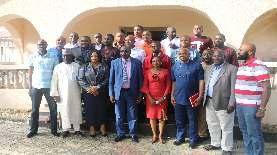
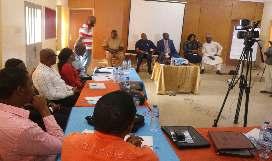
Addressing the trainees, the Managing Director, U G Mohammed, said that TCN management is committed to training all TCN staff to the highestlevel,toensurethatthey rank among the best in the sector. He revealed that close to one thousand engineers had been trained in Osogbo and also at the National Power Training Institute (NAPTIN) and that will continue to train and retrain its staff to ensure optimum performance in job execution.
He noted that the company has reintroduced one year pupilage training programme for all new employees, adding that the 200 electrical engineers that will soon berecruitedwillallundergotheone yearhands-onprogramme.
Earlier, Dr. Vincent Dogo, the lead facilitator of the training programme, assured the Managing Directorandhisteamthatattheend ofthetraining,everyparticipantwill be able to operate and solve challenges on any existing telecommunication equipment in TCN'snetwork.
Engr Ahmed Ihedioha, Senior Manager, Telecommunication Program Coordinator, appreciated
TCN Management is committed to training all TCN staff to the highest level, to ensure that they rank among the best in the sector.
TCN Management for approving the training, saying that this was the first time such intense hands-on training has been conducted for t e l e c o m s o p e r a t o r s H e commended the facilitator and his teamfortheirexpertiseandmethod of knowledge transfer, noting that at the end of the first week of training, every participant singlehandedly spliced fiber optic cables and effectively used the Optical Time Domain Reflectometer (OTDR)totracefaults.
Engr Oghenekaro Balogun, a trainee from Communication
Department, NCC Oshogbo, said that with the knowledge they have acquired,theywouldnowbeableto carry out preventive and breakdown maintenance on the Synchronous Digital Hierarchy (SDH) equipment and fiber optic links which TCN has deployed in different stations in the country. She also disclosed that they are now able to reduce the link downtime and thus improve grid systemstabilityandreliability.
Another trainee, Engr. Ibrahim Aliu, from Abuja Region, disclosed that the training has given them a chance to understand and carry outfirstlevelmaintenanceforSDH systemsandfiberopticsystemsin TCN's network. He equally noted that for him, the training has also set the foundation for grid automationandrealizationofsmart gridsystems.
At the end of the training, Engr Mamman Lawal, Head, Independent System Operator (ISO), who performed the closing ceremony, appreciatedthefacilitatorsforajob well done He reiterated the ManagingDirector'scommitmentto training and retraining engineers, sayingthatthiswouldnotbethelast training for them as more trainings in other modules that are need basedisalreadyonthepipeline.
Cross section of management staff and trainees
Group photograph
TCN NEWSLETTER Transmission Company Of Nigeria 35
EXPERTS CALL FOR ACCOUNTABILITY
IN FG'S FINANCIAL INTERVENTIONS IN THE POWER SECTOR
Following the dwindling power situation in the country despite Federal Government's financial intervention in the sector, post privatization, some experts have called on the government to develop accountability and regulatory framework for the administration of its intervention funds to reposition the sector for a more sustainable electricityindustry.
Speaking in their separate submissions at the December 2019, edition of Nextier Power Dialogue in Abuja, with the theme “Evaluating Federal Government's Financial Intervention in Nigeria's Power Sector”, moderated by Mr. Dozie Okpalaobieri, Energy Sector Policy and Regulations Specialist at the African Development Bank (AfDB),theexpertsreviewedthe rationale of government's interventions and proposed models that would help increase efficiency levels througheffectivecontractsandmarketdiscipline.
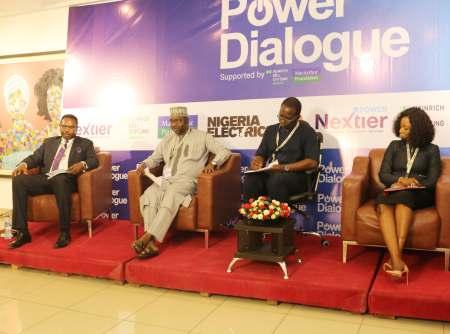 By Eric Ephraim Ene
By Eric Ephraim Ene
urged the government to recapitalize the distribution companies(DISCOs),allowforcostreflectivetariffsin ordertosolvetheproblemofliquidityinthesectorand reset the books of the Discos as no amount of intervention would provide permanent solution withoutdealingwiththerootcause
He stated that the recent action being taken by the Nigerian Electricity Regulatory Commission (NERC) to strengthenthe performanceofthe DISCOs is consistent with calls by TCN since 2017 to make the Distribution companiesmoreefficient.
the experts reviewed the rationale of government's interventions and proposed models that would help increase efficiency levels through effective contracts and market discipline.
Mr. Mohammed however faulted the privatization process that allowed investors without real knowledge intothesector.
According to him, the ECOWAS HeadsofStateshadapprovedthree directives of the West African Power Pool (WAPP) that could strengthen the operations of power firms especially with thehugefinancialinterventiontheyaregetting fromthegovernment.
One of the panelists at the dialogue, the Managing Director and Chief Executive Officer of Transmission CompanyofNigeria(TCN),Mr.UsmanGurMohammed,
Another panelist and the Chief Operating Officer of Ikeja Electric, Folake Soetan noted that in view of the short fall in tariff in the electricity market, there was
(L-R), Head, Infrastructure Finance Office, CBN, Mr Boma Benebo, MD/CEO TCN, Mr U.G Mohammed, Energy Sector Policy and Regulations Specialist, AfDB, Mr. Dozie Okpalaobieri and Chief Operating Officer of Ikeja Electric, Mrs Folake Soetan
TCN NEWSLETTER Transmission Company Of Nigeria 36
need for government’s intervention even as she queriedthesustainabilityoftheprocess.
On his part, the Head, Infrastructure Finance Office, Development Finance Department, Central Bank of Nigeria, Mr Boma Benebo said the platform provided the opportunity for CBN to let the public know why the bankisinterveninginthepowersector.
According to him, CBN's intervention is based on the effect of electricity on the microeconomics of about 37million small and mediun scale enterprises (SMEs) which account for 84 percent of jobs and 4.5% the nation'sGDP.
He stated that there was need for accountability in administration of the fund, and noted that the
interventions by CBN in the power sector in 2013 were put in place to reset the sector with the aim of fixing cost reflective tariffs in order to help the Nigeria electricitymarkettransittocontractmarket.
In his contribution, the Managing Director, Niger Delta Power Holding Company (NDPHC), Mr Chiedu Ugbo commended the CBN for the provision of those interventions and noted that it has saved the generation companies from collapse within the electricityvaluechain.
The Nextier Power Dialogue is a monthly program organized to x-ray various problems affecting the Nigeria Electricity Supply Industry (NESI) and proffer solutions This edition was attended by stakeholders acrossthesector.
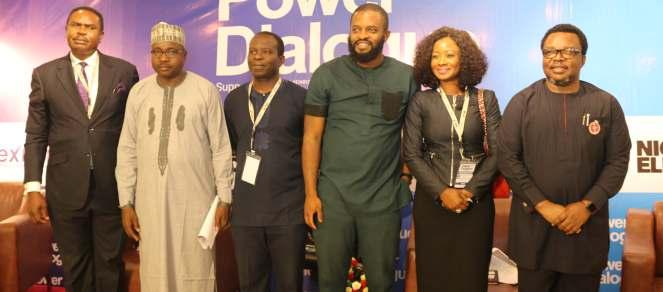
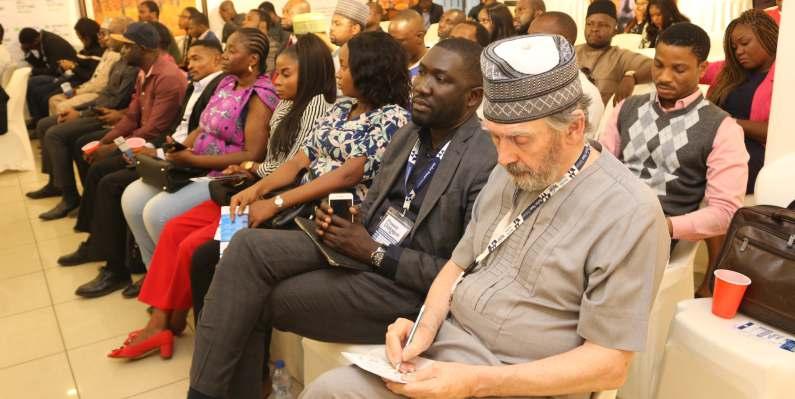 Audience
Group photograph of the panelists
Audience
Group photograph of the panelists
TCN NEWSLETTER Transmission Company Of Nigeria 37
TCN ON COURSE IN IMPLEMENTATION OF TRANSMISSION PROJECTS
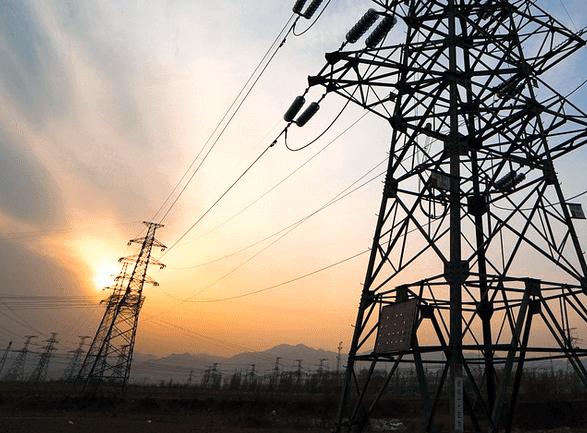
…Targets 10,000MW by 2020.
By Eric Ephraim Ene
TNigeria (TCN), has assured Nigerians that transmission projects being executed across the country are on course, some have been completed while othersareon-going.
he Management of Transmission Company of
TheManagingDirectorandChiefExecutiveOfficerofTCN, Mr Usman Gur Mohammed gave this indication while addressing Energy correspondents from various media houses at TCN's quarterly press briefing on Thursday, 10thDecember2019,inAbuja.
Mr. Mohammed who spoke on TCN's achievements and challenges in the outgoing year disclosed that 68 power transformers have been installed nationwide, mostly by in-house engineers. He informed that TCN was also reconductoring major transmission lines and that the conductorstobeusedforthejobhavebeenprocured.The conductorswouldbeusedformajortransmissionlinesin Lagos, Onitsha, and Kaduna, to further increase grid capacityto10,000MW.
He revealed that TCN has made milestone achievements between February 2017 and October 2019, by diligent implementation of the Transmission Rehabilitation and ExpansionProgramme(TREP).
Mr Mohammed, who is also the Chairman, Executive Board of the West African Power Pool (WAPP), explained that TREP targets raising power transmission wheeling capacity to 10,000 megawatts (MW) in 2020 and to 20,000MWby2023.
He said that various power transmission projects being executed by TCN under TREP include the conducting of transmissionlinesfromAuchitoOkene,PortHarcourtto Ekiti and Ondo States; also, the execution of Lagos-Ogun transmission project which is awaiting approval by the Federal Executive Council, while the contract for the
connection of Eko Atlantic City in Lagos to the national grid will soon be signed. Other on-going projects by TCN include the execution of the Abuja Transmission Ring project which would substantially increase transmission capacity and bring the source of supply into Abuja to three. He also said that TCN was putting N-1 in all the existingtransmissionsubstationsacrossthecountry.
He noted that the recently approved Nigeria Transmission Expansion Project (NTEP-1) by the African Development Bank (AfDB) is a major step in the implementation of TREP and that another major project scheduled is the Northern Corridor, which will run from Calabar to Ikom to Ogoja in Cross River State and to TarabaStateandotherpartsofNorthEastofNigeria.The line, he noted, is multinational and will also interconnect the West African Power Pool and the Central African PowerPool.
Speaking further on key achievements by the company, he explained that TCN has achieved Frequency Control and that generators were all now on free Governor mechanism. He acknowleged challenges in attaining Spinning Reserve and noted that the provision of SCADA was in progress. Speaking on the issue of Right of Way (ROW) he explained that TCN is collaborating with state governments to resolve issues to ensure the timely executionoftransmissionprojects.
Mr. Mohammed reiterated calls for the capitalization and strengthening of operations of the 11 Distribution Companies (DisCos) to enable them evacuate more powerfromtheupgradedandenhancedfacilitiesofTCN.
Respondingtoquestionsonregionalelectricitytradingin West Africa, the WAPP Chairman noted that Togo, Benin and Niger are gradually paying the backlog of their outstandingelectricitybills.
TCN NEWSLETTER Transmission Company Of Nigeria 38
OSOGBO REGION CHECKMATES TOWER COLLAPSE THROUGH EROSION CONTROL
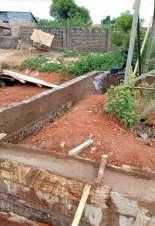 Omideji Oluwakayode
Omideji Oluwakayode
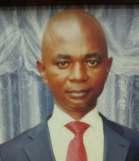
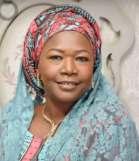
As part of efforts to secure the integrity of transmission towers, TCN has embarked on the fortification of all transmission tower bases nationwide. Thisistoprotectthemfromfactorsthat compromise their base such as erosion and excavation of laterite by miners A secure transmission tower base would avert tower collapse andsavethenationhugesumsofmoneythatcouldbe usedtoexecuteothertransmissionprojects.
In this regard, the Regional Transmission Manager (RTM),OsogboRegion,Engr.OlaniyiOladele,recently inspected on-going works on some transmission tower foundations and erosion control at tower sites in the Osogbo region.
The RTM stated that TCN embarked on a series of e r o s i o n c o n t r o l measures to protect the towers, and that the protection measures include solidifying transmission towers by
erecting barrier walls to p r e v e n t v e h i c u l a r accidents which have caused extensive damages totransmissiontowersinthepast.

He noted that erosion control was also on-going in Ganmo Substation aimed at preventing damage on the T1B 60MVA transformer and primary Bus Bar Gantry closest to erosion site by the Substation. In the same vein, work was also ongoing to protect towers 246 and 264 of 132kV Ganmo Ilorin transmission line, rehabilitate the drainage in Ado-Ekiti 132kV Switchyard andAyedeSubRegionallocations,amongothers.
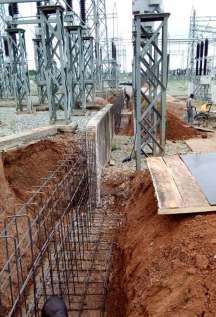
The project supervisor and Principal Manager (Projects),Engr.ChukwuemekaKenneth,reiteratedthe importance of erosion control to support transmission towers and general maintenance of transmission infrastructures,includingsubstations.
While commending the management of TCN for making funds available for the execution of this important project, he explained that the project would checkmate the effects of rainfall around transmission towers and substations, which if left unattended, may cause loss of vitalequipmentincludingthecollapseoftowers.
RestinthebosomoftheLord..!!!
Late Mr. Linus Chibuzo Mba Mgr (M&E) CHQ
Wordscan’twipeawayourtears Hugswonteaseourpain Memoriesofyou willliveinourhearts
TCN NEWSLETTER
Late Hajia Dije Muazu PM (HR) ISO
Transmission Company Of Nigeria 39
CHANGING THE NARRATIVE OF POWER SUPPLY SITUATION IN NIGERIA- MD TCN
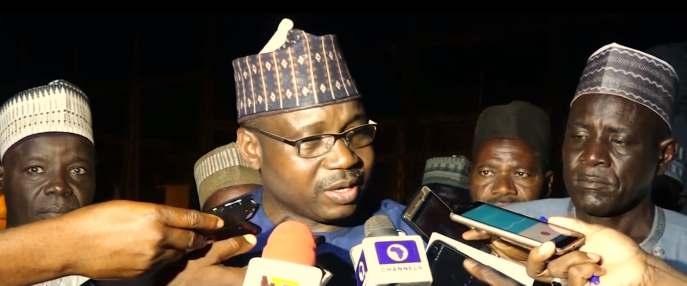 By Maimuna Isah
By Maimuna Isah
In line with the policy of the Federal Government on incremental power, the TransmissionCompanyofNigeria(TCN), has secured $1.661billion from international donor agencies for projects implementation that would ensure further expansion of the transmission grid. While some of theprojectsarealreadybeingexecuted,fundingfor othersareatvariousprocessingstages.
This was made known by the Managing Director, TCN,UsmanGurMohammed,recentlyinKanowhile briefing journalists at the Kumbotso Power Substation,Kano.
According to him, the Federal Government is changing the narrative in terms of power supply in thecountrybyrehabilitatingandexpandingthegrid to 20,000 Megawatts by 2023 under the Transmission Rehabilitation and Expansion Programme(TREP).
He disclosed that the Federal Government has earmarked about N32 billion to compensate Nigerianswhoselands,housesandfarmswouldbe affected by the acquisition of “Right of Way (RoW)” for transmission lines route while executing the projects.
Mr. Mohammed stated that he was in Kano to
inspect and validate the route that runs from the Kumbotso Transmission Substation to Rimin Zakara to determine those that are under the Right of Way so thatadequateplanscanbemadeforcompensationsto bepaid.
The Managing Director revealed that TCN will install 330kV transformer at Rimin Zakara Substation, Kano, as well as connect the Substation to Kumbotso Substation.
He explained that structures on the Right of Way, that would be directly affected by the project, were over 1000anddeclaredthatTCNwouldcollaboratewiththe Kano State Government for relocation of affected persons.
The Managing Director assured that with the completion of the 330kV transmission line for Rimin Zakara, the state would receive supply through multiple sources. He further disclosed that 330kV substations would be added in Jogana and Gezawa LocalGovernmentAreasofthestate,whileaquadline wouldbeconstructedfromKadunatoKano.
All these projects, he said, are in line with the Federal Government's initiative to end epileptic power supply in the country and boost power supply in Kano, the commercialnerveCentreofNorthernNigeria.
the Transmission Company of Nigeria (TCN), has secured
from international donor agencies for projects implementation that would ensure further expansion of the transmission grid.
$1.661billion
TCN NEWSLETTER
MD/CEO TCN, U. G Mohammed, addressing pressmen
Transmission Company Of Nigeria 40
Erection of 330kV Crompton Greaves Circuit Breaker mechanism box on Generator Transformer GT 19 and GT20 Tie 330kV Circuit Breaker at Delta TransmissionSubstation
Installation and Commissioning of new Isolator on T2 60MVA 132/33kV Transformer Secondary Side atAjaTransmissionSubstation
We recorded a sharp reduction in the Transmission Loss Factor (TLF) from 8.03% last month September 2019 to 6.69% in the month of October 2019 which is the lowest record since December2017
Installation of new set of 33kV Current Transformer (CT) on Town Feeder at Oghara 132kV TransmissionSubstation
Commissioneda newly installed primary Circuit Breaker to T21 60MVA, 132/33kV transformer at EffurunTransmissionSubstation
Installation of new 33kV CT on T1A 30MVA 132/33kv transformer at Oji Transmission Substation
Installationof33kVVoltageTransformer(VT)on busbar1atAsabaTransmissionSubstation
the




of 64MVA 132/11kV transformer at Afam1 TransmissionSubstation
Installation of new sets of 33kV Isolators on TR1 60MVA transformer secondary at Owerri TransmissionSubstation
10. Improvement of illumination of 330kV Switch yardatJebbaTransmissionSubstation
A new 2X60MVA Transmission substation built byNIPPAjaokutawascommissioned
Construction of new 2No. Earth Stations for 75MX33kVatBeninTransmissionSubstation
Installation of new 3No. Cooling Fans and 33kV CT HVN on 75MX 33kV Reactor at Benin TransmissionSubstation
14. Commissioning of a new 33kV BCC Circuit BreakeronEnerhenFeederatEffurunTransmission Substation
Installation of new 33kV Circuit Breaker on T1B 60MVATransformersecondaryatAbaTransmission Substation
Installation of new 1No. 50V Battery Bank at KainjiTransmissionSubstation
4.
5.
2.
8. Installation of a new Energy Meter on
primary
7.
6.
9.
11.
3.
12.
1.
16.
15.
13.
ThePersonwhosays itcannotbedone Shouldnotinterrupt thepersondoingit. Chinese Proverb Highlights of some works (September - December, 2019) by TCN engineers as the company continues to rehabilitate and expand the grid TCN NEWSLETTER Transmission Company Of Nigeria 41
SUBSTATIONS
KNOW YOUR SUBSTATIONS KNOW YOUR
ALAGBON TRANSMISSION SUBSTATION A
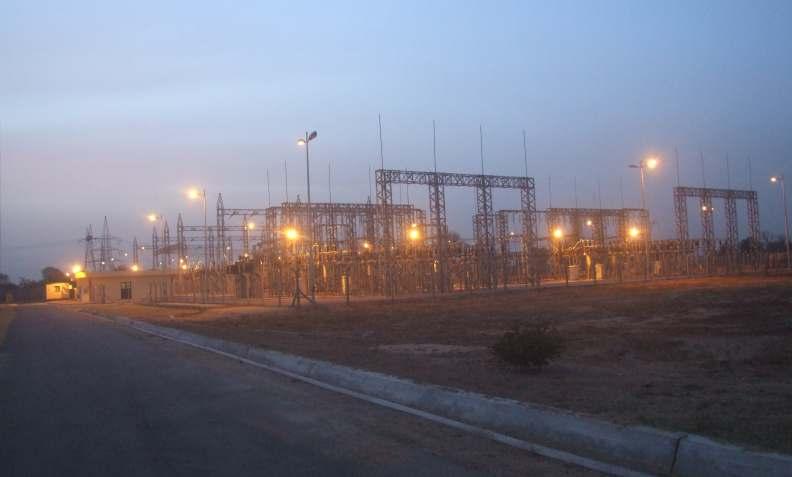
lagbon Transmission Substation was initially commissioned as 132/33kV Substation with 2 X 66MVA, 132/33kV transformers in the year 1983 to deliver power supplytoIkoyi,LagosandVictoria Island.
After a while, the 132kV Switchyard faced the challenge of sinking environment The cable trenches and switchyard roads sunk deeply leaving only equipment plinths which were firmly on piles. This, coupled with population growth and growing electricitydemand,promptedtheawardofacontract undertheNigerianIntegratedPowerProjects(NIPP) toupgradethestationto330/132/33kVcapacitywhile the old sinking outdoor 132kV switchyard was rehabilitated by the Project Management Unit (PMU) ofTCN.
In2012,theentire132kVswitchyardandthe2number 66MVA transformers were shutdown to enable NIPP execute the substation upgrade to 330/132/33kV capacity. Whileworkwasongoing,2number60MVA 132/33kV mobile transformers were installed to ensure continued bulk power transmission to Eko Discofromthesubstation.
Underthecontract,thesubstationwasupgradedtoa
330kV GIS with a 300MVA, 330/132/33kV transformer while the 132kV Outdoor Switchyard was extended to accommodate an additional 2 number 60MVA 132/33kV powertransformer.
On completion of the project in 2016, the 2 number 60MVA 132/33kV transformers and 1 X 300MVA, 330/132/33kV transformer were commissioned. In addition, the existing 2 number 66MVA 132/33kV power transformers in the substation were rehabilitated, while the 60MVA Mobile transformers were also retained in the station, as a result of increased load demandbyEkoDisco.
On 3rd May 2018, one of the rehabilitated 66MVA transformers was gutted by fire, while the other was decommissionedafterfailingintegritytestson5thMay 2019.
In response to the continued increase in load demand by Eko Disco, TCN replaced the two transformers, with a new 60MVA 132/33kV transformer which was commissioned on 16th October 2019. Presently, a 100MVA power transformer is being installed in the substationandwillsoonbecommissioned.
On completion, the new transformer would further increase the substations capacity from 240MVA to 340MVAon132kVlevel.
TCN NEWSLETTER
Transmission Company Of Nigeria 42
TRANSMISSION TERMS
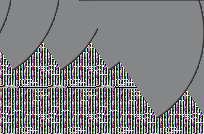

Pool Transmission Facility or Facilities (PTF): Generally speaking, any transmission facility operating at 69 kV or higher and connected to other transmissionlinesortransmissionsystemsis considered a PTF. PTF falls under the authority of ISO New England and the construction of new PTF facilities is generally funded through the ISO on a load ratio sharebasisamongitsmemberutilities.
Phase shifter: Also referred to as a “phase shifting transformer” (PST) or “phase angle regulator” (PAR). A transformer that adjusts the angle between two buses in order to change the amount of power flowing between these buses. Some of these transformers are alsoabletoadjustvoltage.Thesetransformershavean angle capacity which states the extent to which the transformer can adjust the angle between two buses. When the angle capacity is reached before the desired flow can be achieved, it is stated that the transformer ran out of angle or that the angle capacity of the transformerisnotsufficientlylarge.
Non-TransmissionAlternative(NTA):Theuseofanontransmission solution such as local generation or energy efficiency to solve a transmission reliability deficiency.
Contingency:Anunplannedeventcreatinganoutageof a critical system component such as a transmission line,transformer,orgenerator.
Converge: Power flow programs use an iterative
mathematical process to solve for, or converge to, the solution of unknown system parameters such as Voltage and Angle When the mathematics do not result in a solution, the iterative process has “failed to solve” or “failed to converge” to a solution. This result is an indication of voltagecollapseorlossofload.
Critical Energy Infrastructure Information (CEII): Specific engineering, vulnerability, or detailed design information about proposed or existing infrastructure (physical or virtual) that: (1) relates details about the production, generation, transmission, or distribution of energy; (2) could be useful to a person planning an attack on critical infrastructure; (3) is exempt from mandatory disclosure under the Freedom of Information Act; and (4) gives strategic information beyondthelocationofthecriticalinfrastructure.
N-0 or N-1 or N-1-1: The term N minus zero (or one or two) refers to the failure of important equipment. Althoughthesetermssoundcomplex,theyareactually quitesimple.“N”isthetotalnumberofcomponentsthat the system relies on to operate properly. The number subtracted from N is the number of components that fail in a given scenario. Therefore, N-0 means that no component has failed and the system is in a normal condition. N-1 means that only one component has failed. N-1-1 means that two components have failed, which is generally worse than having only one fail (see alsothedefinitionofcontingencyabove).
Skipping Breakfast Puts Your Body in a Constant Stressful State
Always on the run and don't have time to eat the most important meal of the day? Doing this consistently will put your body in a stressful state and disrupts your metabolism People who don't eat breakfast have a greater risk of high blood pressure, being over-weight, and heart issues compared to those who regularly eat within two hours of waking up.
Regularly Eating Fast Food for Lunch Will Increase Your Risk of Heart Disease
Most office-folk go out for unhealthy lunch once in a while-some more than others but even the occasional indulgence has negative effects A portion of fast food usually has about double the calories when compared to similar food of the same size, and it equally has a lot of oxidized fat, which increases the risk of heart disease.
TCN NEWSLETTER
Transmission Company Of Nigeria 43
HOW TO BECOME A MARKET PARTICIPANT
IN NESI
By RC & MD/IR Department
The Nigerian Electricity Supply Industry (NESI) is the power system value chain that ranges from the energy inputs for power generation to the final power consumers, mainly fr om generating plants through the transmissiongridtodistributionnetworkandfinally to the consumers NESI has undergone fundamental changes from 2005 to date with the i m p l e m e n t a t i o n o f t h e government's Power Sector
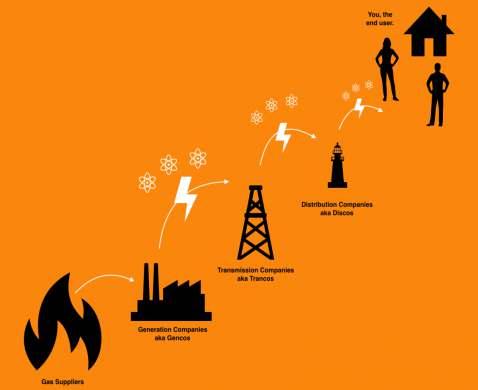
Reform Programme which moved the power sector from a publicly run vertically integrated power system to an unbundled semi privately run power sector with the transmission system still owned and operated by the government.
The Market Rule 14.1 defines A Market Participants as “any person, who wishes to trade or participate in the Wholesale Electricity Market, shall apply to the Market Operator for registration as a Participant in accordance with this Part of these Rules.”
The unbundling of the power sectorcreatedstructuralchanges leading to the creation of the Market Operator. The MarketOperatorischargedwiththeresponsibilityof dealing with all commercial wholesale transactions (trading)ofelectricityinNigeria,makingelectricitya commodity capable of being bought and sold. Currently, the Nigerian Electricity Market is in the
Transitionstageaspartofthereformstagesofmaking the Nation's power system more competitive and liberal. The Market Operator, created in 2004, is currently one of the divisions of the Transmission Company of Nigeria and is mandated under the Power Sector Reform Act to carry on System Operation administering, implementing and operating the Nigerian Electricity Market in a manner that guarantees efficiency,transparency,andnond i s c r i m i n a t o r y m a r k e t administration services to all Market Participants. The Market Operator engages in making, p u b l i s h i n g , a m e n d i n g , administering and enforcing the Market Rules, Invoice Settlement and Payments among Market Participants.
Who is a Market Participant?
The Market Rule 14.1 defines A Market Participants as “any person, who wishes to tradeorparticipateintheWholesaleElectricityMarket, shallapplytotheMarketOperatorforregistrationasa Participant in accordance with this Part of these Rules.”


TCN NEWSLETTER Transmission Company Of Nigeria 44
The purpose of registering Market Participants is to ensure they comply with the established framework and provisions of the Market Rules, Grid Code, Metering Code, Operating Procedures and Market ProceduresamongstotherRulingDocuments.
Who can apply to be a Market Participant?
1. HoldersofaLicensetoconductGenerationor DistributionBusiness.
Holders of a License to conduct Trader Business
3. Owners of authorized small Generation or Self-GenerationPlant.
EligibleCustomer
5. A Transmitter that owns Commercial Metering Systems through which another Participant'sEnergyflowsaremeasured.
6. Anauthorizedcompanyfromanothercountry that participates in Regional Trading through a contract with a Participant located in Nigeria.
7. A member of the Regional Pool authorized to Participate in the Wholesale Electricity Market.
Howtoapply?
An Applicant Participant is any person listed above with the intention of becoming a Market Participant intheWholesaleElectricityMarket.
The Market Rule 14.2 states: “A Participant is a person who has entered into a Market Participation Agreement with the Market Operator, upon fulfilmentofthefollowingrequirements.”
The Applicant Participant upon showing interest will have to submit the following documents to the Market Operator as stated in Market Rule 15 to initiatetheprocess.Belowaretherequirements:
statingintention
CompletedApplicationforms
A Bank draft of N1 5M non-refundable applicableprocessingfee
CopyofCertificateofIncorporation
CopyofNERCLicense(Ifapplicable)
Copy of Grid Connection Agreement or
Provisional Approval to Connect to Transmission Service Provider or Distribution Service Provider. (ForGenCos&EligibleCustomersOnly).
7. ProofofSecurityCover(OnlyforDisCos)
8. TechnicalData(toincludeMeteringSystem,Single Line Diagram, Certificate of Compliance of MeteringEquipment,etc)
If the Applicant Participant fulfils the requirements specified in Market Rule 15, the Market Operator will process the Applicant Participant Application and forwarda Market ParticipationAgreement(MPA) to be duly executed by an authorized representative of the ApplicantParticipant.
Within 15 days after the submission of the MPA, the MarketOperatorwillnotify t h e A p p l i c a n t Participant of its qualification to be accepted as a Participant The Market Operator shall issue a M a r k e t P a r t i c i p a t i o n Certificate with the Participant's unique identification number and a copy of the duly e x e c u t e d M a r k e t Participation Agreement to the Participant.
the key benefit and importance of being a Market Participant, apart from making all ruling documents binding, is the fact that it guarantees an efficient, transparent and non-discriminatory Market Administration Service to all participants.
The key benefit and importance of being a Market Participant, apart from making all ruling documents binding, is the fact that it guarantees an efficient, transparent and non discriminatory Market Administration Service to all participants. Also the participant is privy to all information and data which the Market Operator organizes and maintains centrally, which is pertinent for the smooth administration of the electricity market. One of the key advantages is that the rights and obligations of all participants with regards to operation processes with other participants, MO and other key administrators is stated. The Market Operator strives to ensure discipline and continuous development towards a sustainable competitive market and ensures the Nigerian Wholesale Electricity Market and its participants key into the regional electricity markets anditstradingagreements.
2.
3.
4.
5.
6.
2.
4.
1. Applicationletter
totheMarket Operator
TCN NEWSLETTER Transmission Company Of Nigeria 45
TCN’s END OF THE YEAR PARTY
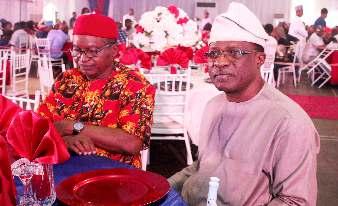
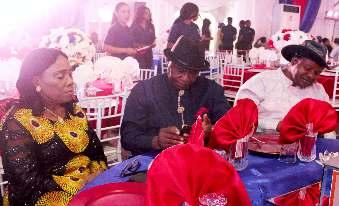
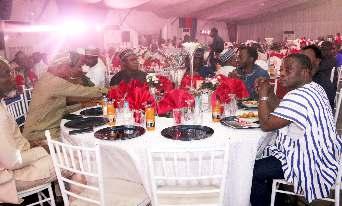
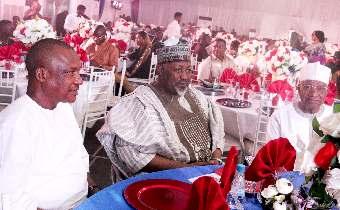

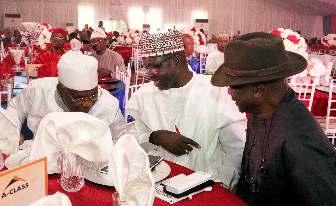
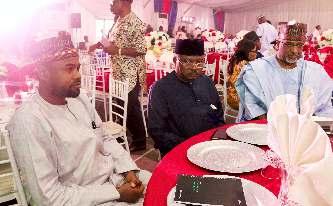
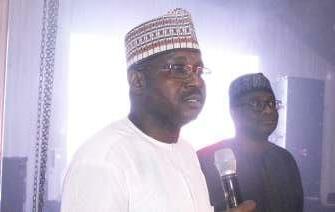
TCN NEWSLETTER Transmission Company Of Nigeria 46
TCN’s END OF THE YEAR PARTY
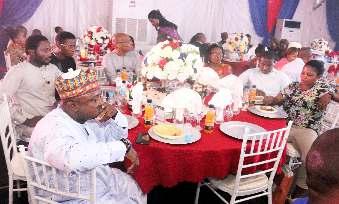

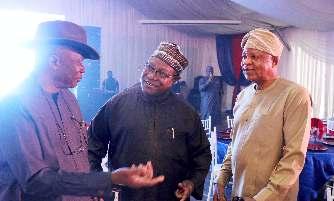

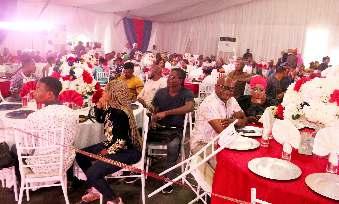
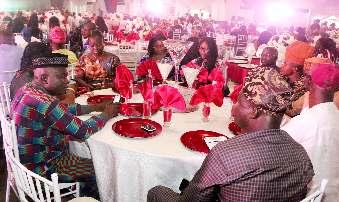
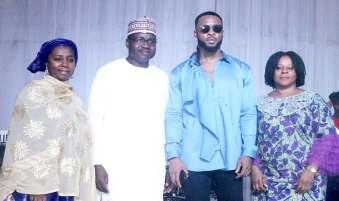

TCN NEWSLETTER Transmission Company Of Nigeria 47
WeddingGalore






 Mr DayoApelehin, son of Mrs.Apelehin, (Mgr) P/A, CHQ, and his wife
Mrs Chisom Udi Lawrence, daughter of Mr. Nwokoye, GM (Engineering), CHQ, and her husband
Mrs , BolanleAdelekan, daughter of Mrs Fasuba, (SM) HR, CHQ, and her husband
Mrs. Olaide Ogbaga, Officer I (ICT) CHQ, and her husband
Mr. Chibuike Nwachi, Officer III (OHS) CHQ, and his wife
Mr. Nwadike Morrison, Officer I (Lines Project), CHQ, and his wife
Mr DayoApelehin, son of Mrs.Apelehin, (Mgr) P/A, CHQ, and his wife
Mrs Chisom Udi Lawrence, daughter of Mr. Nwokoye, GM (Engineering), CHQ, and her husband
Mrs , BolanleAdelekan, daughter of Mrs Fasuba, (SM) HR, CHQ, and her husband
Mrs. Olaide Ogbaga, Officer I (ICT) CHQ, and her husband
Mr. Chibuike Nwachi, Officer III (OHS) CHQ, and his wife
Mr. Nwadike Morrison, Officer I (Lines Project), CHQ, and his wife
TCN NEWSLETTER Transmission Company Of Nigeria 48
WeddingGalore



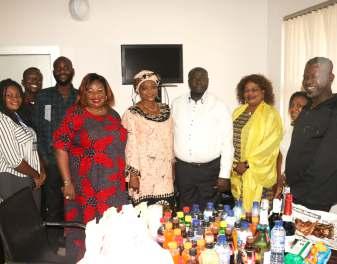
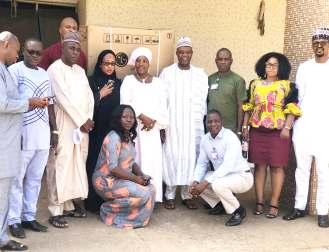
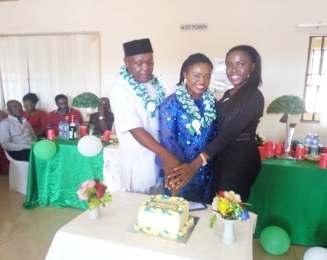

Retirement
(6th Left), Mr Clement Ezeolisah,AGM (PublicAffairs) ISO, during his retirement ceremony
(Middle), Mrs Nnawuihe G. N, PM (Secretary)Audit, during her retirement ceremony
(Middle), Mrs Gbade Sofeso, SM (Secretary) R & D, during her retirement ceremony
(Middle), Mrs Joy Eze, SM (Secretary) Enugu Region, during her retirement ceremony
Mrs Victoria Jinfa, daughter of Mrs.Pauline Lucas, Officer I (ICT), CHQ, and her husband
Mrs. Olaoluwa Victor-Akpan, Officer II (ICT) CHQ, and her husband
TCN NEWSLETTER
Transmission
Company Of Nigeria 49
IMO STATE TO PARTNER TCN ON BULK POWER DELIVERY
 By Mary Philip Udom
By Mary Philip Udom
ImoStateGovernmenthasreiteratedhercommitment to partner with the Transmission Company of Nigeria (TCN), to deliver bulk electricity to electricity consumersinthestatetoenhanceindustrialization.
The State Governor, Rt. Hon. Emeka Ihedioha, gave this indication when he received the management of TCN led bytheManagingDirectorandChiefExecutiveOfficer,Mr. rdUsman Gur Mohammed, in his office on Monday, 23 December2019,inOwerri.
Mr. Ihedioha stated that the Imo State Government was desirous of making impact in the area of industrialization, considering the fact that thestateisoneofthemajorcommercial centers in the country. In his words, “We cannot industrialize the state without power, tell us the timeline for projects in Imo State and we would certainly corporate and partner with you to ensure the timelinesaremet”
The Governor called on the management of TCN to help complete all the on going transmission projects in the state and pledged the state's commitment to settling Way Leave issues, and intervention to resolve any other issue that may hinder the execution of the projects. Amongst the project the governor requested TCN's quick intervention are the re-conductoring of the 132KV Single Circuit ItuAba line; taking over of and maintaining the Ikot-Abasi Eket 132KV Double Circuit line and execution of the proposed Eket-Oron 132KV Double Circuit transmission line and associated 2x60MVA 132/3KV Substation at Oron,amongothers.
readinesstoworkwiththegovernmenttoensureamore timelyprojectexecution.
He noted that the state was one of the beneficiaries of double circuit quad transmission lines currently being executedbyTCNinthecountryandassuredthegovernor that TCN had on ground all the conductors that would be used for lines re-conductoring as well as 100 per cent fundingfortheproject.MrMohammedalsosaidthatTCN wasequallyplanningtobuildUyoworkCentre.
We cannot industrialize the state without power, tell us the timeline for projects in Imo State and we would certainly corporate and partner with you to ensure the timelines are met
Accordingtohim,TCNnolongerembarksonprojectsfor whichitdoesnothavefundstoexecute;everyproject by the company is adequately funded. Some of the on-going transmission projects in the state include; Aboh Mbaise 2 x 60 MVA 132/33kV substation, Ideato 2 x 60MVA 132/33kV substation, Okigwe 2 x 30/40MVA 132/33kV Substation and Owerri to Aboh Mbaise 132kV double circuit transmission line. Others are Nnewi - Ideato - Okigwe 132kV double circuit transmission line, UmuahiaMbano 132KV single circuit transmission line and Alaoji - OwerriOnitsha 330KV double circuit quad transmissionline.
Also speaking during the visit, the President, United Labour Congress (ULC) and General Secretary, National Union of Electricity Employees (NUEE), Comrade Joe Ajaero, appealed to the state government to revisit and revive the Egbeme Power Station which has the capacity to generate 338MW of electricity adequate to supply power to the entire Imo State.
Responding to the governor's requests, the MD/CEO, TCN, Mr. Usman Gur Mohammed assured of TCN's
ThehighpointofthevisitwasthesettingupofaSteering Committee comprising TCN engineers and Imo State Power/Rural Electrification Agency to facilitate the realizationofpowerprojectsinthestate.
TCN NEWSLETTER Transmission Company Of Nigeria 50
MARKET SETSYSTEM TLEMENT
Introduction
Settlement in the Nigerian Electricity Market (NEM) is encapsulated in the process that starts with monthly collation of metering data, evaluation and audit of themeteringdata,applicationof market adjustmentssuchasTransmissionLoss Factor (TLF) and application of the appropriate NERC approved tariff on energy data. The process results in producing and administering the settlement statements for the various MarketParticipants.
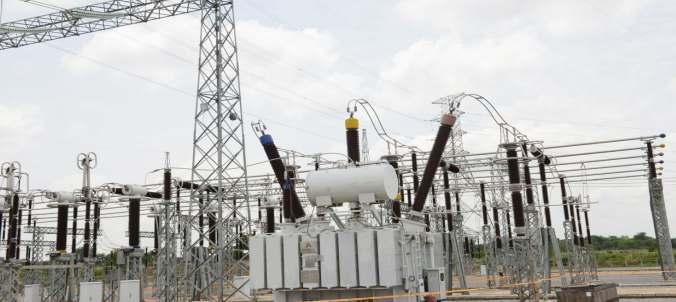
The Market Rules defines settlement as the calculation of charges due from participants who are required to make payment, and to be paid to the Participants (Generators, DisCos, Special traders and Eligible Customers) whoareduetoreceivepayment.
SettlementStatement
TheSettlementStatementshows:
· SystemOperatorandMarket OperatorAdministrationCharges
· AncillaryandSpecialTrader
Charges
· RegulatoryCharges
By Fatima Dikko
agreement or any observed error accordingly, for correction in the FinalSettlementStatement.
· Final Settlement Statement is produced not later than twenty (20) b u s i n e s s d a y s a f t e r t h e commencement of each month and shallcontainthesameinformationas the Preliminary Settlement Statement, unless adjusted to rectify any error or discrepancies observed in the Preliminary Settlement Statement.
Settlementcalendar:
The final document of the process from the Market Operator (MO) is the Settlement Statements forwarded to each participant twice monthly (Preliminary and Final Settlement), stating the payment to be made to each participant and service providers as a result of electricity trading in the market.
· Issue preliminary settlement th thstatement 9 –10
· Receive complaints and effect th thcorrections 10 -14
· Produce final settlement statement
th15 –17
· Dispatch final settlement statement
th18 –20
· Issueinvoicesandcreditadvice20
· ForGenerators–Generatingcapacity and energy quantities sold in the contractforthebillingperiod. The DisCos also receive settlement statementsforthefollowing:
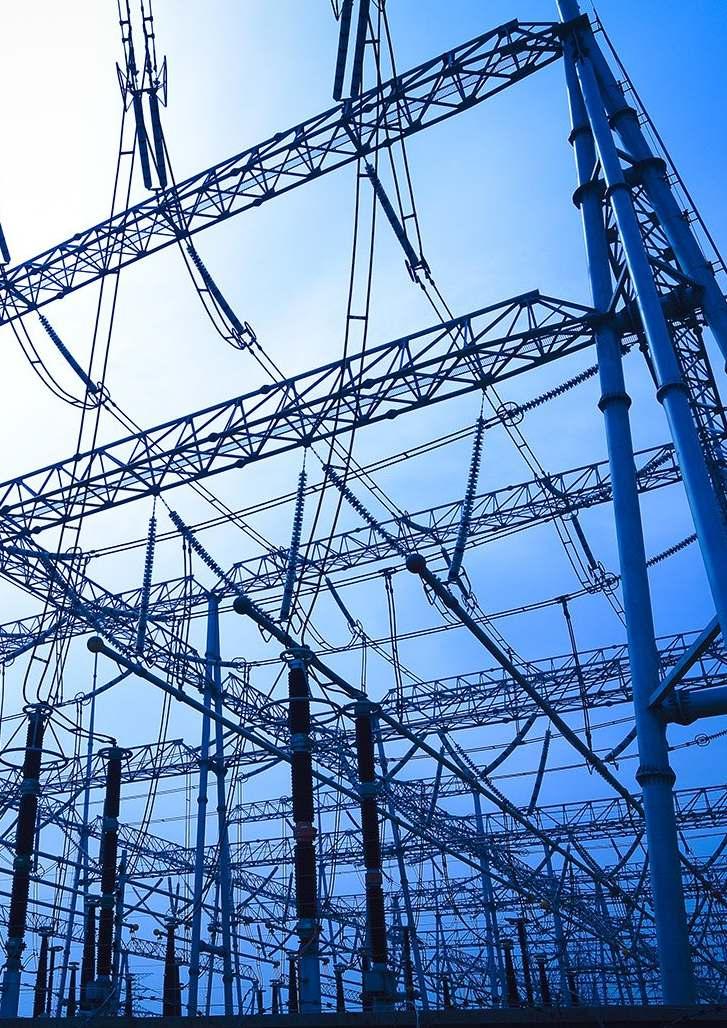
· For each distributor/special trader and Eligible Customers - Capacity and energy quantities consumed duringthebillingperiod.
· Transmissionuseofsystemfees
· Preliminary settlement statement is produced not later than 10 business days of each month for the participantsto:
· Checkiftheenergyfiguresrecorded
In addition, the statement indicates charges receivable by GenCos and service providers/ ancillary services charges payable by the DisCos for a particular billing cycle. In NEM, a billing cycle is 60days corresponding to REBICOLwhichmeans–Read–Billand Collect. The consumption is made in 30days i.e. a month, and the Meter Reading, Billing and Revenue Collection aremadeinthenext30days. andsentoutordeliveredarecorrect.
· Check if the calculations made in arriving at the amount to pay or receivearecorrect.
· Inform the Market Operator of
Settlementprocess:
· Marketsettlementsystem(MR.27.1.2)
The Market Rules provides that the MarketOperatorShallAdministerthe Market Settlement System on a monthly basis and shall develop and maintain the requisite software, acquire the data and record results of the market settlement system. The settlement calculation is done on the
th
th
th
TCN NEWSLETTER
Transmission Company Of Nigeria 51
settlement software The process starts with the metering system wherever possible, each connection point shall have two meters, one of which shall be the official meter and theother,abackupmeter.
MeterDataflow
· Grid meter reading is done jointly between the participant’s RepresentativeandTSPRepresentative.
· Gridmeterreadingsareobtainedfrom two different trading points GenCo/TSPandTSP/DisCo.
· To validate the meter readings both representatives must sign the documents in agreement of the readingsrecorded.
· Each participant and TSP must send ththe data to MO before the 5 day of the month for further processing and reconciliation.
· MO organizes, validates, and where necessary, corrects the Meter Data received from participants, in order to establish the Metered Quantities applicable to each Participant for the settlementprocess(MR.27.6.5)
SettlementCalculations;
i. Data flow, organizing, validating and corrections of data culminate into settlementcalculations.
ii. AllEnergycalculationsforSettlement in the Wholesale Electricity Market shall be measured through the Commercial Metering System (MR.27.6.12)
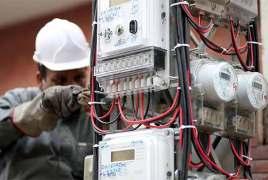
iii. For Power Purchase Agreements or Bilateral Agreements contracted prior to start-up of the Transitional Electricity Market, the metering administration shall be performed in the manner established in the preexistingagreement(MR.27.6.13)
Capacitysharing:
· Percentagesharingisbasedonthe percentage of total energy received fromthegrid
· ForGenCoswithouteffectivePPAs, capacity is equal to the meter reading at the GenCos busbar (before passing throughthegrid)
· ForGenCoswitheffectivePPAs, capacityisaccordingtothePPAs’ provisions.
EnergyImport:
GenCos usually import energy from the Grid for its local or domestic use, while they still generate and inject energy into the Grid. This importation of energy is captured by the bi-directional Energy Meters which simultaneously records both the energy imported as well as the energy injected into the same grid. In a caseofaGenCothatimportsenergyfrom the Grid network, a separate Settlement Statement is prepared for the energy imported depicting the GenCo as energy buyerfromtheGrid.
The GenCo is billed for the energy import and the attributable capacity and services charge at the wholesale level like any other participant taking power fromthegrid.

Invoice:
Invoices are issued once every month after the final settlement statement to theDistributioncompaniesstating:
· The summary of energy consumed by theDiscoforthebillingperiod
· The month’s invoice amount of the DisCo
· The transmission loss factor amounts duetoorfromtheDisCo
PreliminarySettlement
Statement:
· The Participant shall notify the Market Operator within five (5) business days of receiving the preliminary settlementstatement.
· MO reviews complaints from participant
· If necessary, MO corrects the error in thefinalsettlementstatement
· MO issues final settlement statement. Sections 28 3 also provides for complaints on the final Settlement Statement.
FinalSettlementStatement:
· If any Participant complains on final settlementstatement(FSS),
· MO wouldtryanamicablesolution;
· Adjustments (if required) are made immediately following the month in whichdisputewasresolved
· The breakdown of what is due to AdministratorsandRegulators
· And in some rare situations adjustmentsthatmayariseasaresult of disputeresolution.
CreditAdvice:
Credit Advice are issued once every month after the Final Settlement Statement (FSS) to Service Providers stating:
· Thesummaryofenergywheeledinthe electricityMarketforthebillingperiod
· TheamountduetoAdministrators
· TotaloutstandingagainsttheDisCo and Regulators in their respective creditnotesforthebillingperiod.
ComplaintsandDisputes:
Administration of complaints (MR28.1.3) provides that Complaints/disputes arises where a market Participant disagrees or found an error or discrepancyonthesettlementstatement issuedbytheMarketOperator.
· if the complaint is not resolved within fifteen (15) business days, it should be resolved in accordance with the disputeresolutionmechanism.
· Section 28.3.1 provides that "At any time within sixty (60) days of receiving a Final Settlement Statement, a Participant may notify the Market Operator of any complaint or dispute relating to its contents, concerning either:
· The contract quantities, or The settlement amount in respect of ServiceandCorrectionCharges,or
· The settlement amount in respect of ServiceandCorrectionPayments”
Up to the point of the FSS, complaint couldberesolved.If,howeverMOandthe participant fail to resolve the issues raised, the complaint becomes a dispute in line with section 28.3.3 of the MR and the dispute follows the procedure in section43oftheMR.
TCN NEWSLETTER Transmission Company Of Nigeria 52
THE POWER SYSTEM LOSS FACTOR (PSLF) AND THEIR EFFECT ON DISCOS INVOICES
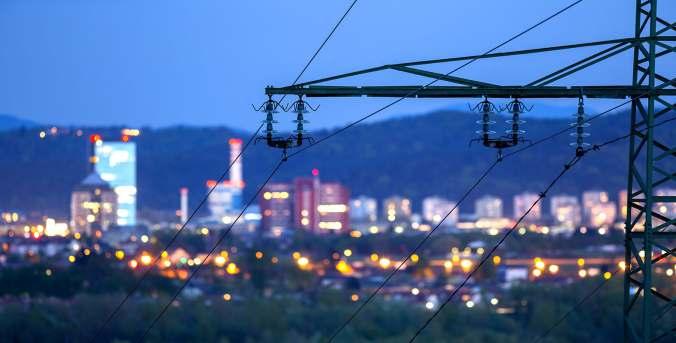 By Ismail Dalhatu
By Ismail Dalhatu
Among the outstanding and major challenges in the Power System are the losses. Power Systemlossesrefertotheenergythatislost as electricity is transmitted across the transmission network from generation, through the national grid tothepointofdistributiontotheendusers.Generally power losses are an unavoidable consequence of transporting electricity and the longer the distance energytravels,thegreatertheenergylostontransit.
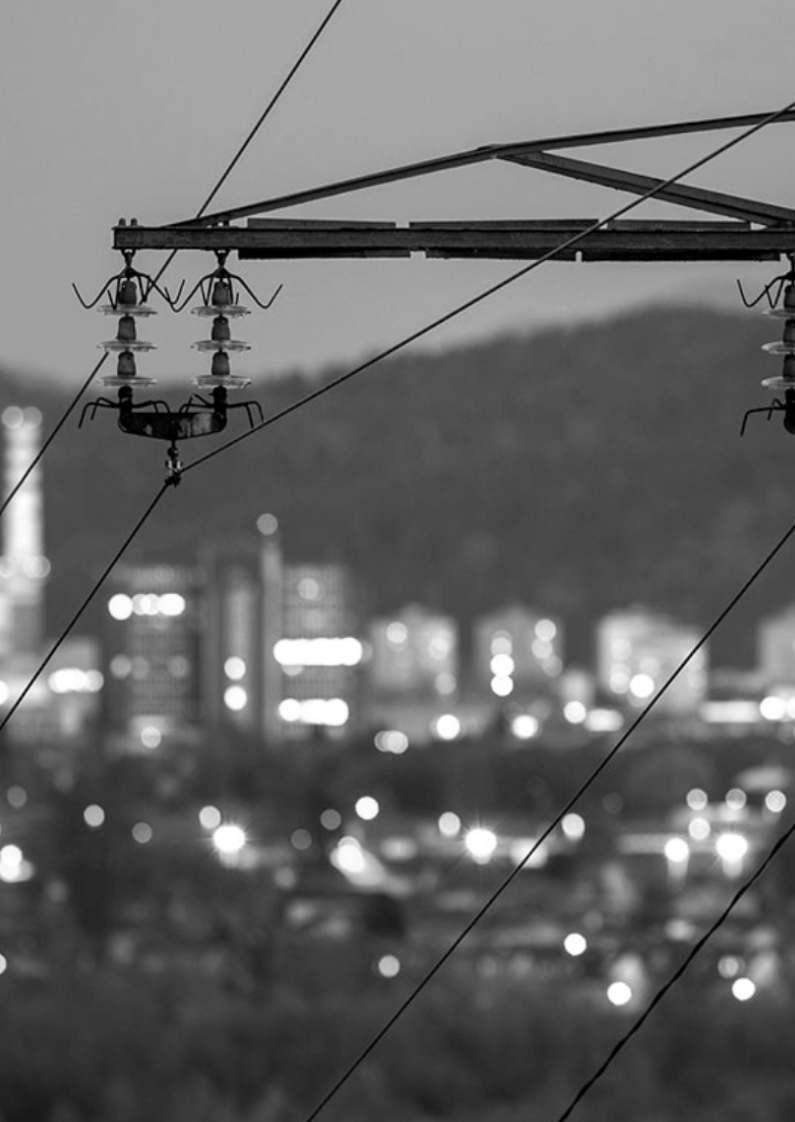
Electrical energy is generated at power stations which are usually situated far away from load centers As such, an extensive network of conductors between the power stations and the consumers is required. This network of conductors maybedividedintotwomaincomponents,calledthe transmission system and the distribution system. The transmission system is to deliver bulk power from power stations to distribution load centers and large industrial consumers while the distribution system is to deliver power from transmission substationstovariousconsumers.
The efficiency of the transmission component of the electricpowersystemisknowntobehamperedbya numberofproblemswhichincludetheapplicationof inappropriate technology, inadequate materials, equipment,andmanpower.Transmissionlineshave someresistanceassociatedwithpowerlossesinthe conductor. Therefore, resistance and conductance are responsible for power losses on transmission lines. The Power system losses can be divided into two categories which are: the technical and nontechnicallosses.
Technicallossesarelossesduetocurrentflowingin the electrical network which is mainly caused by
p h y s i c a l e l e c t r i c i t y h a r m o n i c distortions, low voltage,lossdueto aging and outdated equipment. Technical losses are directly dependent on the network characteristics andthemodeofoperation.
The efficiency of the transmission component of the electric power system is known to be hampered by a number of problems which include the application of inappropriate technology, inadequate materials, equipment, and man power.
Non-technical losses on the other hand are caused by actions that are external to the power system. They are losses not related to physical characteristics nor functions of the Power System and are more human related, thus making it difficult to measure. These loses are often unaccounted for by the System Operator, consequently, they are not recorded.
The most probable causes of non-technical losses areelectricitytheft,metertampering,poorcollection efficiencyanderrorsintechnicallossescomputation thatoftendistorttechnicalinformation.Transmitting electricityathighvoltagereducesafractionofpower transmitted due to heating. For a given amount of power, higher voltage reduces the current and thus theresistivelossesintheconductor.
During the Pre-Transitional stage of the electricity market, the commission pegged the TLF (MYTO) threshold to be 8.05% which meant that the GenCos willbeinvoicedfortheirtotalenergysentless8.05%.
Transmission loss above the MYTO approved rate of 8.05% was passed on to the GenCos irrespective of what it was. A complaint was thereafter made and a
TCN NEWSLETTER Transmission Company Of Nigeria 53
meetingwiththeCEO'sofGenCoswasheldinNERC to deliberate on who eventually bears the excess transmission loss. At the end of deliberations, the commission resolved that the excess loss above theapprovedratebepassedontotheTransmission Service Provider (TSP) since it is the entity responsibleforwheelingbulkenergy.
In furtherance to the issue of TLF, the commission issued a supplementary order on TEM to address the financial surpluses or deficits arising from TSP's management of the Transmission Loss Factor(TLF)betweenTSPandtheelevenDisCosas follows:
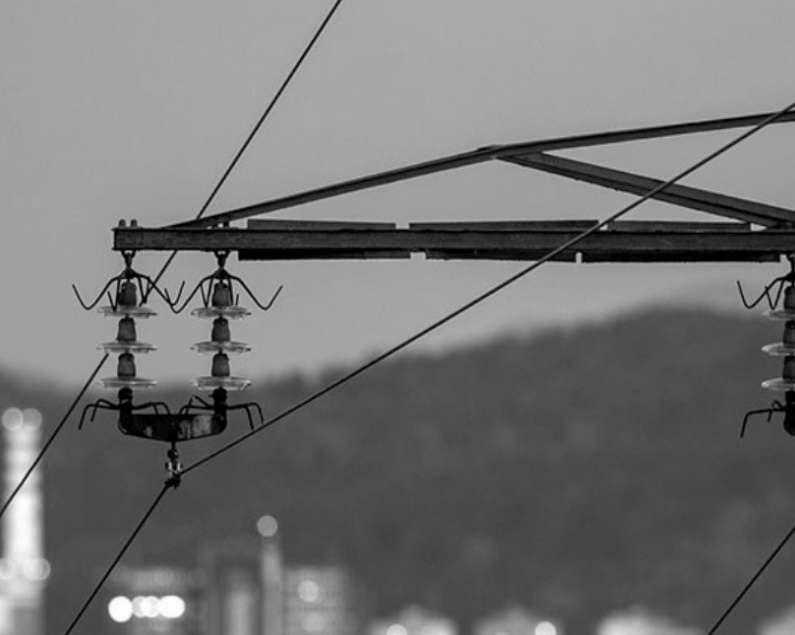
I. The Settlement Statement (or other document approved by the Commission) will state the actual aggregateTLFforthesettlementcycle;
ii. The MO shall apportion the positive or negative difference between the actual TLF and 8.05% to the respective DisCos in line with their percentage of totalconsumption;
iii. In the event that the actual TLF is in excess of 8.05%, each DisCo may net off the amount due to it from the TSP, as a deduction from TSP’s wheeling chargesforthecycle;
iv. In the event that the actual TLF is below 8.05%, each DisCo will pay its portion of the differential to
TSP, in addition to the DisCo's wheeling charge for thecycle.
v. The amount to be paid by each DisCo will be calculated by applying a charge rate which is equivalent to the weighted average cost of energy and capacity for the settlement cycle; or any other amountapprovedbytheCommission.

In summary, TLF varies monthly and in a billing monthwheretheTLFislessthanthebenchmarkof 8.05%, the TLF energy, which is the difference between the actual transmission loss and the regulated loss, is shared by the DisCos in proportion to the percentage share of total consumption. This reduces the actual energy delivered to the DisCos and the resultant effect is that Transmission Service Provider gets an increaseinrevenuehavingdoneafantasticworkon thegridtokeeptheTLFbelowthebenchmark,with a corresponding increase in DisCos invoices. This means that the DisCos will pay more for services renderedbytheserviceproviders(MO,SO,TSP)
On the other hand, if the TLF is above 8.05%, the excess energy (TLF Energy) increases the actual energydeliveredtotheDisCos.Theresultanteffect is that TSP gets a deduction in its revenue for energy wheeled which also reduces the invoiced amount the DisCos will pay to service providers for servicesrendered.
TCN NEWSLETTER
The richest wealth is
. The strongestWisdom weapon is Patience. The best security is Faith. The greatest tonic is & SurprisinglyLaughter, all are free.
Transmission Company Of Nigeria 54
MARKET OPERATOR AS THE SUPERINTENDENT OF THE NIGERIAN ELECTRICITY MARKET
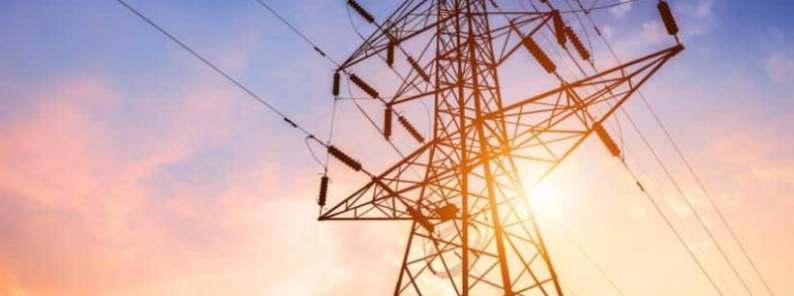 By Florence Oluchi Onyima
By Florence Oluchi Onyima
From inception, the Market Operator of the Nigerian Electricity Market through the Electric Power Sector Reform Act (EPSRA) 2005, and the Market Rules, has the responsibility of Administration of the Electricity Market. Among the powers vested on the Market Operator are Enforcement ofMarketRules,MarketProcedures,Compliance Auditing, Sanctions on Electricity Trade Defaulters, and Non-compliance with the Market Rules and Market Procedures. Electricity trade participants include all the Market Participants who are registered with The Market Operator as providedinMarketRules1.4.2,45.1.2.
Pursuant to Section 26(2) of the Electric Power Sector Reform Act (EPSRA) 2005, the then Minister recommended the Market Rules to the President. The rules received the President’s approvalonthe15thFebruary,2010byOrderNo.3 of 2010. The Market Rules document was on approval published in the Federal Gazette of 17th February, 2010. The Market Rules has since been reviewedin2014.Bytheapprovalandpublication of this Ruling document, the Market Operator, whichwasalsotechnicallyreferredtoasSystem Operator in EPSRA 2005 sections 26(3a - c), 26(3c)(i – iii), 26(3d), 26(5) and 26(6) became the 'Policeman' of the Nigerian Electricity Market (NEM). The use of 'System Operator' in EPSRA 2005 encompasses both System Operator and MarketOperator.
The Obligation to comply with the Market Rules andMarketProcedures
To have adequate arrangements for enforcing compliance with the Market Rules and Market Procedures governing the Nigeria Electricity Market (NEM) under the administrative coverage of the Market Operator, Market Rules 45 broke the Rules Enforcement down bit by bit. For instance, Rules 45.1.2 states that the Market Operator shall ensurecompliancetotheseRulesbyallParticipantsandall Transmitters. Rules 45 of the Market Rules also provides guidelines for breach of agreement which gives Market Operator the leverage to impose financial penalties, disconnect, suspend and even terminate a Participant’s tradingrights.
IftheMarketOperatorputsitsfeetdownindeterminationto maximizeitsmarketcompliancedrive,MarketParticipants andTransmittersbothinNigeriaandacrossboarderwillsit up. Compliance Enforcement in 2019 on some Market ParticipantsisatestimonytotheeffectivenessofRules45. We are optimistic that the Electricity Market will grow and get better even though it requires a steady push by enforcing Market Rules and other Ruling documents, when necessary.
ItisimportanttonotethatRules45givesroomfordialogue and to this effect, the Market Operator can also be called The 'Compliance Adviser' to the Participants. What this means is that Market Operator reaches out to the Participants on any questions or concerns they may have, reviews their complaints from them and discusses with them on how to prevent breaches from occurring and reoccurranceofbreaches.
TCN NEWSLETTER
Transmission Company Of Nigeria 55



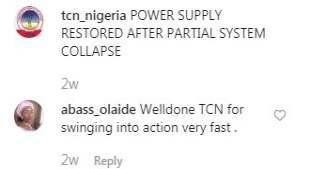





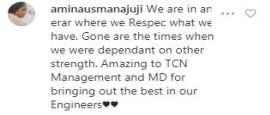

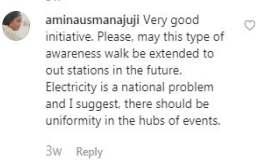
Transmission Company Of Nigeria 56






























 Cross section of Delegates at the event
Minister of Power, Engr. Sale Mamman
Cross section of Delegates at the event
Minister of Power, Engr. Sale Mamman

 (5th from right) Minister of Power Engr. Sale Mamman
Chairman WAPP and MD/CEO TCN, U. G Mohammed
(5th from right) Minister of Power Engr. Sale Mamman
Chairman WAPP and MD/CEO TCN, U. G Mohammed














 Group Photograph
MD/CEO TCN, Mr U. G Mohammed making a presentation
Group Photograph
MD/CEO TCN, Mr U. G Mohammed making a presentation










 Cross section of delegates
Secretary to the Government of the Federation (SGF), Mr. Boss Mustapha
Minister of Power, Engr. Saleh Mamman
Chairman WAPP and MD/CEO TCN, Mr. U. G Mohammed
MD Mainstream Energy, Engr. Lamu Audu
During WAPP General Assembly
Cross section of delegates
Secretary to the Government of the Federation (SGF), Mr. Boss Mustapha
Minister of Power, Engr. Saleh Mamman
Chairman WAPP and MD/CEO TCN, Mr. U. G Mohammed
MD Mainstream Energy, Engr. Lamu Audu
During WAPP General Assembly












 Delegates visit Katampe Substation and other sites in FCT Abuja
Minister of State, Power, Goddy Jedy Agba
Chairman WAPP and MD/CEO TCN, Mr. U. G Mohammed
Minister of State, Power, unveils WAPP North Core Project Group photograph
Katampe Substation
Arts and Craft Village
City Gate
Delegates visit Katampe Substation and other sites in FCT Abuja
Minister of State, Power, Goddy Jedy Agba
Chairman WAPP and MD/CEO TCN, Mr. U. G Mohammed
Minister of State, Power, unveils WAPP North Core Project Group photograph
Katampe Substation
Arts and Craft Village
City Gate




 By Grace Sambe-Jauro
By Grace Sambe-Jauro

 Cross Section of staff from power agencies in Abuja
Cross Section of staff from power agencies in Abuja
 By Engr. Seun Amoda
By Engr. Seun Amoda






 By Eric Ephraim Ene
By Eric Ephraim Ene

 Audience
Group photograph of the panelists
Audience
Group photograph of the panelists

 Omideji Oluwakayode
Omideji Oluwakayode




 By Maimuna Isah
By Maimuna Isah






























 Mr DayoApelehin, son of Mrs.Apelehin, (Mgr) P/A, CHQ, and his wife
Mrs Chisom Udi Lawrence, daughter of Mr. Nwokoye, GM (Engineering), CHQ, and her husband
Mrs , BolanleAdelekan, daughter of Mrs Fasuba, (SM) HR, CHQ, and her husband
Mrs. Olaide Ogbaga, Officer I (ICT) CHQ, and her husband
Mr. Chibuike Nwachi, Officer III (OHS) CHQ, and his wife
Mr. Nwadike Morrison, Officer I (Lines Project), CHQ, and his wife
Mr DayoApelehin, son of Mrs.Apelehin, (Mgr) P/A, CHQ, and his wife
Mrs Chisom Udi Lawrence, daughter of Mr. Nwokoye, GM (Engineering), CHQ, and her husband
Mrs , BolanleAdelekan, daughter of Mrs Fasuba, (SM) HR, CHQ, and her husband
Mrs. Olaide Ogbaga, Officer I (ICT) CHQ, and her husband
Mr. Chibuike Nwachi, Officer III (OHS) CHQ, and his wife
Mr. Nwadike Morrison, Officer I (Lines Project), CHQ, and his wife






 By Mary Philip Udom
By Mary Philip Udom



 By Ismail Dalhatu
By Ismail Dalhatu



 By Florence Oluchi Onyima
By Florence Oluchi Onyima











